Pay strike ballot

Your magazine from the National Education Union Breastfeeding rights Landmark ruling for NEU member. See page 24. Ukrainian refugees Driving women and children to safety. See page 26.
Preliminary poll results lead to formal ballots. See pages 6-7. November/ December 2022 “People can’t actually afford to be teachers.” See pages 30-33
More than 3 million people are now dedicated to the Revitive Circulation Booster®, which is high-tech yet needs no specialist operation.
Revitive is being shown to help with symptoms such as the feeling of tired legs and puffy ankles. The circular footrest is a dynamic hub for electrical muscle stimulation (EMS) technology, sending electrical pulses gently up through the feet and into the body.









Few people realise it but the calf muscles act as our ‘second heart’, pumping blood



up from the body’s farthest reaches back to the heart. It’s no secret that things tend to slow through ageing or being less active. After we’ve been on our feet for a while, at best many of us suffer from symptoms where we find our legs feeling tired and ankles puffy. Yet sufferers are discovering that these are a thing of the past thanks to Revitive Circulation Booster ©a drug-free therapy device which actively increases circulation. Revitive should be used daily, from just 30 minutes.
Let Revitive weave its magic while you sit back in your armchair and watch TV or read.






EASY TO USE – switch on, place your bare feet on footpads and increase intensity until your calf muscles contract, then just sit back, relax & let Revitive go to work.



EFFECTIVE – Revitive creates Electrical Muscle Stimulation (EMS) which sends gentle electrical pulses up through the feet which contracts the calf muscles to get your leg muscles pumping & may help provide relief from the feeling of tired legs and puffy feet and ankles, while you relax.



CLINICAL TRIALS – Imperial College London’s vascular surgery department at Charing Cross Hospital London has conducted extensive clinical studies.





DRUG-FREE – Revitive is a class IIa medical device offering a drug-free solution and you may be entitled to claim back the VAT if you suffer from a long-term illness - call for further details.




by the Professor:
“Revitive uses clinically proven EMS technology which I know works.”


– Professor Jonathan Beard, Consultant Vascular Surgeon Sheffield Teaching Hospitals










Tired, Heavy Legs? Puffy Ankles? “Get your leg muscles pumping to help put a ‘Spring’ in your step” FREE HOME DELIVERY
90-DAY RISK-FREE† TRIAL Buying as a Christmas gift? Buy today & 90-day trial won’t start until 25th December Simon, Beverley Have tried taking medication to improve circulation in my left leg, but this knocks them out of the park!” FREE PHONE: Call free! 0800 014 6046 Lines open: Mon-Fri 8am-5.30pm & Sat 9am-2pm www.revitive.com Post completed coupon to: Dept RDX3356, Actegy Ltd, 1 Westpoint, Western Rd, Bracknell, RG12 1HJ YOUR DELIVERY AND PAYMENT DETAILS PLEASE TICK BOX FOR PAYMENT OPTIONS BELOW OPTION 1: REVITIVE Essential One Payment of £149.99 Inc. VAT OPTION 2: REVITIVE Essential 4 interest-free Payments of £37.50 Inc. VAT* (Credit & Debit cards only) *Available on credit/debit cards only, subject to status. Initial deposit is due at time of order and payments will be charged to your credit / debit card. There will be no interest charges from Actegy Ltd, but in the event of late payment credit/debit card company charges may apply. I enclose Cheque / Postal Order made payable to ‘Actegy Ltd’. Please write name & address on back of Cheque P.O. Your order will be despatched as soon as your cheque has cleared. SIGNATURE Title First Name Surname Address Postcode Email Tel Charge my: Visa Visa Debit MasterCard Maestro Card No. Start Exp Security Issue Date Date Code No. Last 3 digits on reverse Maestro only Occasionally we may send exclusive o ers by post & email. Tick here if you prefer not to receive these . To change your preference, visit privacy policy on www.revitive.com Quote Code RDX3356 UNSUITABLE IF YOU ARE: Fitted with a heart pacemaker or AICD; being treated for, or have the symptoms of, an Existing Deep Vein Thrombosis (DVT); pregnant. Always read the label. Use only as directed. If you are uncertain about the cause of your symptoms or your symptoms persist, please consult your Doctor. ††TRIAL: With Revitive, median arterial blood flow increases over 50% versus baseline at rest in healthy people during use (Varatharajan et al, 2014. The effect of footplate neuromuscular electrical stimulation on venous and arterial hemodynamics, Phlebology, July 4, 20 participants.) NEW Revitive Medic Bundle from £299.96 (£249.96 excl VAT). *Free standard P&P worth £7.99. [Some areas of Scotland, Northern Ireland and other remote postcodes, if returned within 90 days, full refund of purchase price minus a Remote Collection fee of £8.99.] Must be returned in original UNDAMAGED packaging, otherwise charges may apply. 1 trial per customer only & trial starts from dispatch date. All quotes used are real however, to protect the identity of our customers, models have been used for the pictures. Copyright © 2021 Actegy Ltd. All rights reserved. Revitive and Circulation Booster are trademarks or registered trademarks of Actegy Ltd. Registered in England no. 4819502. Registered office Actegy Ltd, Westpoint, Western Rd, Bracknell, RG12 1HJ, UK. AW:18405320 03.22.
Patented Stimulation Waveforms Clinical study shows significant increase in blood flow Researchers from Imperial College London demonstrated in a clinical study†† that Revitive significantly improves blood flow by over 50%. Actively increase circulation to reduce these symptoms with the Revitive Circulation Booster® CLINICALLY PROVEN if you have High Blood Pressure High Cholesterol, Diabetes or Arthritis, you may qualify for VAT relief - call for details. Long term illness or disability? With our NEW MEDIC RANGE OFFER VALUE £187.98 NOW ONLY £149.99 Revitive Essential is NOT eligible for VAT relief INCLUDES Revitive Essential device PLUS... FREE UK mainland DELIVERY* FREE REPLACEMENT BODY PADS READER OFFER ON REVITIVE ESSENTIAL SPREAD THE COST WITH EASY-PAY 4 INTEREST-FREE PAYMENTS OF £37.50 (Credit & debit cards only) SAVE £37.99 WORTH £10 WORTH £7.99 “Try Revitive. It just might change your life.” Lord Ian Botham, cricket legend & Revitive user Our customers say Excellent . Rated 4.4 out of 5 Leslie, Devon Noticed an immediate improvement. feel my varicose veins are no longer as painful & I believe I’ve not had an attack of cramp since using it.” Marie, Merseyside Since using Revitive daily I’ve benefi ted from a noticeable reduction in puffi ness in both of my feet and lower legs. I would recommend it to anyone.” PERFECT GIFT for ALTERNATIVELY SAVE £103 on REVITIVE MEDIC BUNDLE Call us for details of Offer & VAT relief
THIS issue of Educate is published just as we launch a postal ballot for strike action for a fully funded, inflation-proof pay rise for teachers and support staff.
It is vital that all members vote Yes when the ballot paper arrives on your doorstep in late October or early November. Please vote right away then post your vote in the pre-paid envelope provided.
No one makes the decision to strike easily. Teachers and support staff want to be in the classroom, working with children and young people to educate and support the next generation.
But there comes a time when we must make a stand. Teachers and support staff are leaving education in droves because of inadequate pay combined with excessive workload. This exodus is harming the education we are able to provide. Parents know this. That is why they support our industrial action.
The cost-of-living crisis has hit everybody. Our members tell us of their difficulties making ends meet.
Support staff are taking second or even third jobs to pay the bills. Teachers are struggling to pay their mortgages or childcare costs.
Yet the Government has made an offer that will mean a seven per cent pay cut for teachers during the worst cost-of-living crisis for a generation.
In this issue of Educate we talk to members about why they’re voting yes – see page 30. And Kevin Courtney gives an impassioned plea to vote Yes on page 11.
In this issue we also meet Tara Mellor, who won a significant claim for breastfeeding women (see page 24). And we talk to the very courageous Rosa Cembrowicz who travelled to Ukraine to collect refugees and drive them to safety (see page 26).

We also have all the regulars – including commentary, puzzles, letters, a poem from Michael Rosen and more.
I’m proud to be your joint general secretary and proud of this issue of Educate. Enjoy it.
Mary Bousted National Education Union Joint general secretary

educate Your magazine from the National Education Union (NEU) 3
WelcomeEducate November/December 2022 Faye Curran, interviewed for an NEU film on pay. See page 30 Photo still
by
HARK Films harkfilms.com Your magazine from the National Education Union Breastfeeding rights Landmark ruling for NEU member. See page 24. Ukrainian refugees Driving women and children to safety. See page 26. Pay strike ballot Preliminary poll results lead to formal ballots. See pages 6-7. November/ December 2022 “People can’t actually afford to be teachers.” See pages 30-33 TO ADVERTISE IN EDUCATE Display adverts t: 020 7880 7614 e: educate-magazine@redactive.co.uk Recruitment adverts t: 020 7880 8542 e: educate-jobs@redactive.co.uk Except where the NEU has formally negotiated agreements with companies as part of its services to members, inclusion of an advertisement in Educate does not imply any form of recommendation. While every effort is made to ensure the reliability of advertisers, the NEU cannot accept any liability for the quality of goods or services offered. Educate is printed by Walstead Bicester Ltd. Inside pages are printed on paper comprised of 100% recycled, post-consumer waste. NEU president Louise Atkinson NEU joint general secretaries Mary Bousted & Kevin Courtney Editor Max Watson Journalists Sally Gillen, Emily Jenkins & Sarah Thompson Newsdesk t: 020 7380 4760 e: educate@neu.org.uk Design & subbing Amanda Ellis neu.org.uk facebook.com/ nationaleducationunion twitter.com/NEUnion








educate Your magazine from the National Education Union (NEU)4
OxfordCambridgeandRSA
Engineering,Psychology, PhysicalEducation, and Geography
by Matt Wilkinson


mortgage rate increases as I have no more money. It has got to the stage where I feel I can’t afford to do my job anymore. This makes me sad as I love my job, I love my school, I feel like I can make a real difference. If we were paid in line with real-time inflation we would not be losing so many amazing teachers and support staff from the profession. We deserve better. Hannah, West Bromwich.
Andy, Horsham.
Contents Regulars 23 Michael Rosen 35 Tim Sanders & Warwick Mansell 36 Ask the union & CPD 37 A class act 40 Jon Biddle & reviews 42 Teacher’s pet & letters 48 Puzzle pages 50 Final word Features Pay ballot 6 Ballot update Teachers, sixth form and support staff start returning their Yes votes. 7 Next steps Formal postal ballot –dates and instructions. 9 Cost-of-living crisis United front at party conferences. 11 Kevin Courtney opinion ‘We must beat the thresholds.’ 30 Why we’re voting Yes It’s time to fight together – and for the Government to pay up. 21 Joe Strummer: ‘The future is unwritten’ The Clash frontman remembered. 24 ‘A degrading environment’ Union wins landmark ruling for breastfeeding women (left). 26 Helping Ukrainian refugees Member travels to war zone to drive displaced families to safety (above). “I cried watching the news. I was so upset.” p26-29 The rest is history 13 November 2002 When local authorities offered firefighters a four per cent pay increase, the Fire Brigades Union demanded 39 per cent and balloted for strike action. Their first two-day strike began on 13 November and the dispute lasted until June 2003 when the union accepted a deal worth 16 per cent over three years. educate Your magazine from the National Education Union (NEU) 5 26 I have been in teaching for 20 years. I am a single mum with a mortgage, and life has been getting more and more difficult financially. I’m really worried about
NEU2773 P0163 M002 Teachers pay up ballot statutory leaflet v3.indd 1 18/10/2022 13:09 School support staff are already some of the lowest-paid workers around and we really cannot afford another cut. We play vital roles which require training, expertise and experience, but many of us are paid effectively below minimum wage. We badly need a pay rise, not for greed or luxury, but because we deserve to live without being in constant fear. We work in this sector because we care and we want to make a difference, but the message we receive from the Government is that we are close to worthless. We deserve better. We all do. Fair pay and conditions for all education workers. Fully funded. Or we strike. Because it’s time for action.
NEU2776 P0163 M003 Support staff pay up ballot statutory leaflet.indd 1 18/10/2022 12:01 News 8 Disability History Month Focus on health and wellbeing. 13 No Child Left Behind Universal free school meals. 15 It’s not OK Anti-sexism toolkit launched. 24PHOTO
Sixth form ballot closes 11 November
MEMBERS working in sixth-form colleges in England are being formally balloted for strike action over pay until 11 November.
The ballot opened on 18 October. It follows an indicative ballot in which 97 per cent of members said they would be prepared to strike after being offered a pay rise of just five per cent by the Sixth Form Colleges Association.
The pay offer at a time of rocketing inflation and a costof-living crisis falls way behind what is acceptable.
NEU joint general secretary Mary Bousted said: “Teachers in sixthform colleges have suffered a realterms pay cut of 20 per cent since 2010 and, in the midst of a cost-ofliving crisis, are not prepared to see their income fall further.
“The Government needs to address what is now a serious problem for the sector.”
Mary added that sixth-form colleges play an important role in the education of young people, and failing to give a fully funded, aboveinflation pay rise would lead to a further drain of staff, diminishing the education of young people.
Pay up: teachers
AROUND 300,000 teachers and support staff across England and Wales are being formally balloted for strike action over pay, after voting overwhelmingly in favour in the union’s preliminary ballots.
Angry and demoralised teachers sent a clear message to Government that they are prepared to strike – 86 per cent voted Yes in the ballot that took place between 24 September and 14 October. Seventy-eight per cent of support staff would vote Yes to strike action (see below)
As Educate went to press, the union had written to employers notifying them of a formal ballot between 28 October and 13 January. Strike action is likely to begin the week of 30 January.
NEU joint general secretaries Mary Bousted and Kevin Courtney said: “The Government’s refusal to fully fund the meagre pay rise for 2022/23 is the final insult. We repeat our willingness to meet with Government to find a serious answer to more than a decade of declining pay.”
The union does not ask members to take action lightly, but we cannot stand by and see members suffer growing hardship. Teachers’ pay has fallen by 20 per cent since 2010, and this year’s offer of just five per cent, at a time of soaring inflation, is a real-terms pay cut of seven per cent.
Members are demanding a fully funded, above-inflation pay rise for teachers.
‘I can’t afford to do my job anymore’ The cost-of-living crisis is pushing thousands of members into poverty. They are rationing energy at home, borrowing money from friends and family to pay the bills, taking second – even third – jobs, and relying on food banks to feed their families.
Single parent Hannah, a teacher with 20 years’ experience, said: “I feel I can’t afford to do my job anymore. If we were paid in line with real-time inflation, we would not be losing so many amazing teachers and support staff from the profession. We deserve better.”
Commenting on the results of the preliminary ballot, Mary and Kevin said: “This is a clear statement from teachers that they cannot go on like this. Their pay has been eroded considerably in recent years, and with the growing cost-of-living crisis, our members will face even greater challenges to make ends meet.”
The value of the £30,000 starting salary, promised at the start of the 2019 General Election and introduced this September, has already been wiped out by inflation.
Poor pay – after workload the second biggest reason for teachers leaving the profession – is now driving thousands more out, worsening the recruitment and retention crisis.
“Members don’t want to strike – they want to be in the classroom, doing what they do best, educating the nation’s children,” said Mary and Kevin.
“It is regrettable that we have reached this point, but enough is enough.”
Support staff vote to reject pay offer and Yes to strike action
SEVENTY eight per cent of support staff voted Yes to strike action in the NEU’s consultative pay ballot on the Government’s offer.
In August, local government employers put forward a pay offer for support staff, which would mean a rise of between six and eight per cent for most NEU members. With inflation currently at 12 per cent, this offer means that since 2010 support staff pay has declined by a staggering 27 per cent.
The pay offer also does not provide
any promises that it would be fully funded by employers or the Government, meaning schools will need to find money from already overstretched budgets to meet the increase.
In the consultative ballot, 92 per cent of NEU support staff rejected the pay offer and 78 per cent said they were willing to strike to see a better, fully funded, above-inflation pay rise.
The NEU has now moved forward with a formal postal ballot for industrial action opening on Friday 28 October and closing on Friday 13 January (2023).
NEU joint general secretaries Mary Bousted and Kevin Courtney said: “Be in no doubt that today’s ballot result is a warning shot from support staff that they will not and cannot tolerate further unfunded or belowinflation pay rises.
“Despite our best efforts, the Government is yet to put more money on the table. Strikes would of course be regrettable, but we need to make a stand in order that the Department for Education sees sense. Support staff deserve better.”
educate Your magazine from the National Education Union (NEU)6
News
NEU2775/0922 In our POSTAL ballot from 31 October to 13 January VOTE NOW To industrial action for a fully funded, above-inflation pay rise. VOTE YES neu.org.uk/support-staff-pay The National Education Union is undertaking a formal strike ballot to demand a fully funded, above-inflation pay rise for support staff. Teacher members and sister teaching unions are conducting one too. Our preliminary electronic ballot confirmed the overwhelming strength of feeling about your inadequate pay offer. And yet the Government still fails to act.
to be formally balloted
What next? Please post your ballot paper

Pay ballot – timescale Around 300,000 teacher and support staff members will be balloted over pay between 28 October 2022 and 13 January 2023.
n The union will issue members with a formal postal ballot asking you to vote YES in favour of strike action to win a fully funded, above-inflation pay rise. n You will receive the ballot paper from 31 October onwards. The envelope will be marked YOUR NEU BALLOT PAPER ENCLOSED. n If your ballot paper doesn’t arrive, please email us at ballotenquiries@neu.org.uk as soon as possible. n Please vote as soon as you receive the ballot paper, as postal delivery may be slow due to strikes by Royal Mail. n Our sister unions the NASUWT and NAHT are also balloting their members. n By law, a formal ballot for action needs to be postal. n At least 50 per cent of eligible members need to vote, with at least 40 per cent voting in favour of action. PLEASE USE YOUR VOTE . NEU2771/0922 In our POSTAL ballot from 31 October to 13 January VOTE NOW The National Education Union and our sister unions are now undertaking formal strike ballots to demand a fully funded, above-inflation pay rise for teachers. Our preliminary electronic ballot confirmed the overwhelming strength of your feeling about the pay cut. And yet the Government still fails to act. We are the NEU – join us. neu.org.uk/join 0345 811 8111 TEACHERS DESERVE BETTER To industrial action for a fully funded, above-inflation pay rise. VOTE YES neu.org.uk/pay NEU2771
NEU signs up to Covid pledge
IT is still unclear what the impact of the pandemic will be over the late autumn and winter period.
What we do know is that Covid-19 hasn’t gone away, and scientists have warned about future waves.
The NEU will continue to press the Government on any issues or concerns as they arise.
n As Educate went to press, staff aged 50 and over, as well as those in clinical high-risk groups, were eligible for a booster. We recommend that members check their eligibility at bit.ly/3M5JECP
n The NEU website remains the best source of up-to-date guidance. Our joint union guidance with GMB, Unite, Unison and UCU recommends practical steps to reduce the risk of Covid-19 spread and disruption and is available at bit.ly/3fF5pwW
n Ventilation plays a key role in controlling the spread of the virus, so it is important that schools continue using the CO2 monitors they received last academic year. Find out more at neu.org.uk/ coronavirus-ventilation
n The NEU has signed up to the Covid safety pledge - covidpledge.co.ukand you may wish to encourage your school to do the same. Signing up highlights a commitment to protect workers and others by continuing to risk assess to reduce the spread of infection and specifically to support workers and others to stay at home if testing positive.
n See our guidance for at-risk staff at neu.org.uk/advice/high-risk-groups
n Check out our joint union protocol on long Covid at neu.org.uk/ media/21291/view
n Thinking of becoming a health and safety rep? Email healthandsafety@ neu.org.uk
UKDHM shines spotlight on disability, health and wellbeing
THIS year’s UK Disability History Month (UKDHM) will take place between 16 November and 16 December. The theme for this year is disability, health and wellbeing.

UKDHM was set up in 2010 to create a platform from which to focus on the history of disabled people’s struggles for equality and human rights. The month examines how this can be highlighted and advanced through education.
The NEU has a range of resources available to help support members throughout the year as well as during UKDHM. These include the NEU’s The Full Story resources for early years and primary age children, which aim to promote disability inclusion through reading; and the disability equality toolkit, which is designed to be used by NEU
workplace reps to support disabled members.
The NEU believes in the social model of disability, which recognises that people are disabled by the attitudes and structures of society rather than by their impairments.
n For information and resources visit ukdhm.org
n For NEU resources visit neu.org.uk/disability
Supporting language and communication
Language development in Secondary
The ability to express ourselves, understand others and be understood is the foundation skill for learning, life and work. Many young people in secondary schools have poor language skills and need supported opportunities to develop their abilities in order to learn in the classroom, make friends and achieve.
! Research consistently shows that when needs are overlooked, difficulties with language can turn into behaviour problems, disengagement and influence mental health. At the very least difficulties with language will impact on attainment.
This leaflet outlines four key things you can do to enhance all students’ communication skills as well as develop your support for those who need a more targeted approach.

THE NEU has launched new resources to help educators support pupils’ language and communication skills.
The Covid-19 pandemic has meant that the number of children and young people with speech, language and communication difficulties is on the rise. Many people take communication for granted, but for some children communicating is difficult.
Produced with ICAN, the speech and language specialists, the NEU’s new resources outline key actions that schools can take to enhance all children’s communication, as well as provide effective support for those who need a more targeted approach. Individually targeted at early years, primary and secondary school language skills, each leaflet includes tips for understanding language progression as well as signposting to resources.
n Visit neu.org.uk/supportinglanguage-development
educate Your magazine from the National Education Union (NEU)8
News
United unions condemn cost-ofliving crisis at party conferences

THE NEU presented a united front with colleagues from the NAHT and ASCL at the Labour Party conference in Liverpool and the Conservative gathering in Birmingham. We hosted joint meetings to highlight how real-terms cuts to teachers’ pay and the costof-living crisis will have a damaging impact on education outcomes.
Speaking at the Labour meeting, NEU joint general secretary Mary Bousted said that over the past 12 years teachers had lost 20 per cent of their wage in real terms. This had created a crisis in teacher supply and the children most affected are those in the most challenging schools.
The president of ASCL, Evelyn Forde, warned that, “the cost-of-living crisis is tipping education into a precarious position.

If our schools are not funded properly, we will be left with a substandard education system.”
Labour MP Emma Hardy highlighted how the cost-of-living crisis meant that seven million households were doing without essentials right now. This bad situation was only going to get worse and it was time “to challenge the normalisation of poverty”.
Also speaking at Labour conference, Councillor Tim Roca from the Local Government Association’s Children and Young People Board expressed concern that schools were grappling with an unfunded pay award, rising child poverty and a growing SEND crisis, adding “they shouldn’t have to manage this”.
At the NEU’s meeting on the fringe of a tumultuous Conservative Party conference, Paul Whiteman from the NAHT noted how over the last decade education had been subjected to continuing austerity. With teacher recruitment targets missed for eight out of the last nine years, poor funding and inadequate and unfunded pay rises, the Government needed to get a grip or the quality of education would suffer.
Steve Mastin from the Conservative Education Society acknowledged that teachers hadn’t had a pay rise for a very long time. As this year’s award hadn’t been funded by the Government, he said that he fully expected lots of schools to go into deficit over the next six months.
Finally, Barbara Crowther from the Children’s Food Campaign told heartbreaking stories of the reality of the costof-living crisis for many children and young people.
She had heard of children hiding in the playground as they didn’t have money to pay for their lunch and children pretending to eat from empty lunchboxes. Ample justification –if it was needed – for the NEU’s call for free school meals for all primary children.
educate Your magazine from the National Education Union (NEU) 9
“If our schools are not funded properly, we will be left with a substandard education system.”
Evelyn Forde, ASCL
n See page 13
Support staff vote for pay strikes Preliminary pay ballot results for support staff: 78 per cent Yes to strike action on a 68 per cent turnout. See page 30
(From left) Paul Gosling, president of the NAHT, Cllr Anntoinette Bramble of the Local Government Association, Shadow Education Secretary Bridget Phillipson and Mary Bousted, at Labour conference PHOTO by Jess Hurd
Why teachers’ pay and the cost-of-living crisis impact on education outcomes
PHOTO by Jess Hurd
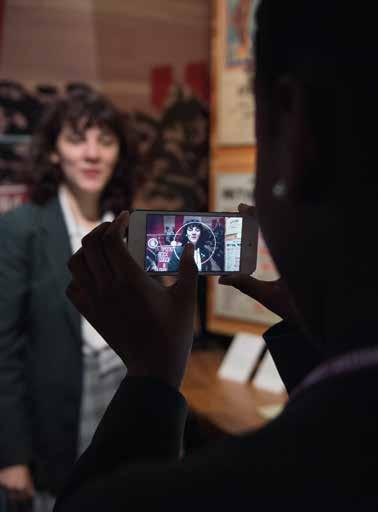












educate Your magazine from the National Education Union (NEU)10 TELL THE STORIES THAT NEED TO BE HEARD Book your school visit to IWM now iwm.org.uk/learning LIVE IN OR AROUND NORTH LONDON? Qualified teachers needed to teach motivated pupils on weekday evenings and/or Saturdays WE OFFER GREAT RATES l Primary Years 1 - 6 l Secondary Maths l Secondary Science l Secondary English 020 8440 8586 www.afterschoollearning.com Established 2007 Please email CV to: info@afterschoollearning.com WE NEED YOU! Get noticed with your advert here For more information, contact: Tel: +44 (0) 20 7880 7614 Email: educate-magazine@redactive.co.uk Your magazine from the National Education Union Welfare at work Happy teachers make good teachers. See page 22. Cost-of-living crisis Scandal of in-work poverty in education sector. See page 25. Pay ballot NEU to ballot members for a decent pay rise. See page 7. September/ October 2022 Walkin’ on sunshine Tolpuddle marchers’ joyful celebration of solidarity Your magazine from the National Education Union September/ October 2022
Together we can overcome these obstacles
NEU joint general secretary Kevin Courtney urges all members to vote Yes in the pay ballot.

“ THERE is a tide in the affairs of men, which taken at the flood, leads on to fortune,” – Julius Caesar.
Quotes can mean many things to many people. But the fact that the NEU, NASUWT and the NAHT are all balloting their members at the same time means there is a mood shift – a tide in the affairs of teachers and support staff – as well as of other working people.
There are moments when we have to act, in order to take the flood.
It may not be that it leads to fortune –no teacher or member of support staff earns a fortune. But perhaps it can stop year after year of getting poorer, and ensure some fortunate funding for our schools.
That’s why it is so important that every NEU member who is balloted fills in their ballot form and returns it in the post. There are, however, big obstacles in front of us.
n We are legally precluded from electronic methods of running a formal ballot.
Despite the fact that political parties can use electronic methods securely and secretly, unions are precluded by the Government from such methods.
So we have to ballot you on paper at the home address recorded for you on our database and then you have to get your vote back to the returning officer by post.
n More than 50 per cent of members must return a postal ballot.
Anyone who doesn’t return a ballot is effectively counted as a No vote.
n More than 40 per cent of all members must vote Yes.
Not 40 per cent of those who vote, but 40 per cent of all the members who are balloted. Once again, this means not returning a ballot form or missing the post, counts as a No vote.
For all these reasons winning a ballot across around 24,000 schools is difficult.
But on the positive side: the Government has set these ‘thresholds’ believing that we can’t reach them. So if we do, it will cause a political earthquake.
There are already backbench MPs in the Conservative Party worried about the prospect of school cuts and the difficulty of recruiting and retaining teachers and support staff. If we pass the thresholds, alongside NASUWT and the NAHT, those worries will become much more real.
We know that our members do not want to strike. They are concerned about their students. They don’t want to lose pay. They are concerned about the attitude parents will have to any strikes.
Neither Mary nor I want a strike either. But we both believe that if the Government doesn’t listen then strike action will actually be the responsible thing to do.
Each year we prepare comprehensive evidence to the School Teachers’ Review Body, which looks at the trends in recruitment and retention, and compares pay levels with private sector graduate employment. We give that evidence to Government and speak with ministers about it – we use every technique of persuasion we have.
But despite the overwhelming evidence we present, Government turns away from it and makes ideological decisions.
Its decisions to suppress pay and underfund the pay rises they do award are so
damaging to education. Schools can’t recruit and retain support staff - because pay rates are better in supermarkets than for the skilled roles that support staff undertake. Support staff have seen the real value of their pay decline by 27 per cent since 2010.
The Government keeps missing its teacher recruitment targets and retention problems keep growing. This increases workload for the teachers who remain.
Those experienced teachers who remain have seen the value of their pay decline by 20 per cent up to this year. If the five per cent award isn’t improved, that pay loss increases to 24 per cent since 2010.
We know it’s difficult but we are asking you: please vote Yes, and please encourage your colleagues in whichever union to vote Yes.
We will do all we can to use those ballot results to persuade the Government it has to move.
n If your ballot paper doesn’t arrive, email ballotenquiries@neu.org.uk
Opinion educate Your magazine from the National Education Union (NEU) 11
HQ 13085 Return Address Civica Election Services PO Box 46556 London N1 0WW CES YOUR NEU BALLOT PAPER ENCLOSED – PLEASE OPEN AND RETURN ASAP NEU2775/0922 In our POSTAL ballot from 31 October to 13 January VOTE NOW To industrial action for a fully funded, above-inflation pay rise. VOTE YES neu.org.uk/support-staff-pay The National Education Union is undertaking a formal strike ballot to demand a fully funded, above-inflation pay rise for support staff. Teacher members and sister teaching unions are conducting one too. Our preliminary electronic ballot confirmed the overwhelming strength of feeling about your inadequate pay offer. And yet the Government still fails to act. NEU2775 P0163 M003 Support staff pay up ballot statutory poster.indd
Campaigning for assessment change in Parliament
THE NEU has launched an All-Party Parliamentary Group (APPG) as part of its ongoing examination of assessment in schools.
The independent APPG for schools, learning and assessment, co-chaired by Conservative MP Flick Drummond and Labour MP Emma Hardy, will provide a forum for parliamentarians, educators and education policy experts to promote and support school-level education and examine the quality of learning and assessment for all pupils.
Through working with the APPG, the NEU hopes to make the case for change in Westminster. Over the coming term the APPG will be holding an event to bring together the chairs of various commissions that have been looking into assessment reform –including the NEU-backed Independent Assessment Commission – to explore the need for change and possible recommendations for a future system.
The APPG plans to launch an inquiry later this year into the assessment system in England and hopes to release a report of its findings in 2023.
n Visit schoolsappg.org.uk
Smoking and health charity releases new vaping guidance NEW guidance for schools on youth vaping and smoking has been produced by Action on Smoking and Health (ASH), the leading UK charity working to end the harm from smoking.

The guidance aims to support educators to develop policies around vaping. It has been produced with support and advice from teachers with expertise in safeguarding and health education. It includes facts on smoking and vaping, questions to inform wider school policies and ethos, and links to helpful resources.
n Visit bit.ly/3SHcVGs
n The guidance sits alongside the more detailed Briefing on youth vaping for local authorities, which is available at bit.ly/3SUJuAd
Six-figure settlement for life-changing injury
THE NEU legal team has won £550,000 compensation for a member after an accident at work ended her teaching career.
Lis Stuart, a primary teacher from Oxford, suffered life-changing injuries in 2018. Arriving at work, a colleague accidentally reversed into a wall in the car park above, which collapsed and trapped Lis beneath the fallen bricks.

Lis suffered multiple orthopaedic injuries including a fractured pelvis and ribs, and numerous crushing injuries to various parts of her upper and lower body. She was unable to walk for 18 months and unable to work as a teacher again.
“It was frightening. I remember looking up and seeing the back of the car hanging on the edge above me,” recalled Lis.
She was in hospital for several weeks. Initially, due to a misreading of the Burgundy Book by the school, Lis was offered only a week and a half of sick leave instead of the 12 months she was entitled to. So she turned to the NEU for help.
“It was an incredibly frustrating process. I really want to encourage members to get to know the Burgundy Book and exactly what you’re entitled to, because without the NEU I might have only got a week and a half of sick leave for an incident where I was in hospital for weeks,” said Lis.
Lis also faced a four-year battle with her colleague’s insurance company after bringing a civil claim for damages. Lis
discovered that this would also be covered under her NEU membership.
“It didn’t even occur to me that the NEU could help me with legal support. I thought I was going to have to pay maybe £45,000 or more for a lawyer, but in the end I got one for free by virtue of my union membership. It’s incredible really,” she said.
Lis finally reached a settlement this year for £550,000. This includes damages for her injuries, her past and future loss of earnings, and her ongoing care and potential care and assistance she might need in the future.
“It’s been a long and difficult journey, but at least my family and I now have something to help support the care I need now and in the future,” said Lis.
Malthouse: ninth DfE boss in eight years
THE ninth Education Secretary in eight years was appointed last month.
Welcoming the appointment of Kit Malthouse, NEU joint general secretary Kevin Courtney warned that the new Education Secretary would need to get to get to grips with the “long list of major flaws and issues in our school and college system”, including chronic underfunding, excessive workload and a recruitment and retention crisis.
Kevin added that Mr Malthouse would
only be able to deliver workable solutions if he listened to and worked with the profession, students and parents.
“The Education Secretary cannot ignore the problems. Our current education system is on its knees despite the huge efforts of school leaders, teachers and support staff to plaster over the cracks,” he said.
“There needs to be a determination from Government to ensure every child and young person gets the education they deserve.”
educate Your magazine from the National Education Union (NEU)12
News
Lis Stuart
Pay ballot – potential strike dates
Dates for potential strike action over pay are yet to be decided, but are likely to be from the week commencing 30 January 2023.
NEU calls for free meals for all primary pupils
THE NEU and The Mirror newspaper have launched a new campaign calling for the Government to extend free school meal (FSM) provision to every primary school child in England.


FSMs in England are available for all primary school children until the end of year 2, but from year 3 onwards, millions of children aged as young as seven miss out on a healthy meal at school.
In a letter addressed to former Prime Minister Liz Truss, and signed by more than 100 MPs, faith groups, charities and celebrities – including former footballer Gary Lineker and chef Tom Kerridge – the NEU wrote:
“We are living through the greatest costof-living crisis in a generation, and too many families with young children are being pulled into poverty.
“Teachers and support staff see the difference a healthy school dinner makes. When children are hungry, they can’t learn. It’s hard for them to concentrate and harder to reach their potential. Free school meals for all would mean every child can learn and succeed.”
It is already well known that poverty can have a profound impact on attainment and educational outcomes. According to data from charity the Joseph Rowntree Foundation, by age 11, only around three quarters of children from the poorest fifth of families reach the
government’s expected level at key stage 2, compared to 97 per cent of children from the richest fifth.
In 2020, Scotland pledged to extend FSMs for every child in primary education, and this year Wales followed suit. In the letter to the former PM, the NEU has made clear that “it is time for England to catch up”.
NEU joint general secretary Kevin Courtney said: “A hot school dinner every day will support millions of children whose families are facing the impossible choice of paying for heating or eating during the worst cost-of-living crisis in a generation. We must make sure no child is too hungry to learn.”
n Sign the letter at nochildleftbehind.org.uk
Survey shows 49% of trans and non-binary staff bullied at work
NEU research exploring the professional lives of more than 1,000 LGBT+ members reveals how LGBT+ inclusion is beneficial for all students.
However, in some workplaces, bullying and isolation continues to be a problem, and for trans and non-binary staff that picture is shown to be significantly worse.
Nearly a third (29 per cent) of all respondents had experienced being bullied at
work. This figure rose to 49 per cent among trans and non-binary staff.
Eighty-nine per cent felt it was important to have visible LGBT+ role models in school, yet nearly half of respondents were not open about their sexual orientation or gender identity at work.
Feedback from schools also highlighted how much creative, inclusive teaching is underway. Many schools were evaluating
their management practices and curriculum approaches. LGBT+ staff have great ideas and commitment but also a clear desire to do this work in collaboration as a whole-staff group.
NEU joint general secretary Mary Bousted said: “We want to empower all staff in schools to feel confident to model positive values. LGBT+ staff have employment rights that aren’t being realised and that’s where unions have a responsibility to negotiate better policies.”
educate Your magazine from the National Education Union (NEU) 13
Kevin Courtney, NEU joint general secretary, at the launch of the campaign to extend free school meals at Labour Party conference PHOTO by Jess Hurd
“When children are hungry they can’t learn. It’s hard for them to concentrate and harder to reach their potential.”
Strike-breaking school agrees to pay compensation
NEU members have settled a dispute at Drapers’ Pyrgo Priory School in Havering, east London, after a row about the use of supply staff to break the strike.
Support staff members at Drapers’ Pyrgo had been on strike since the summer term over the school’s decision to downgrade support staff roles and cut hours (Educate, September/ October, page 12).

The school has now agreed to pay compensation (between £750 and £1,000) to all staff who have lost pay through having their hours cut. The strike action also won an extension of grade protection from one to two years. Some members had faced cuts in hours, others were to be downgraded, while some were threatened with both.
NEU regional officer Michael Gavan said: “The strike was definitely worthwhile. We’ve won significant compensation for the cuts to hours, which makes good the loss members would have suffered for between eight to 12 months. And we doubled the length of their salary protection, which helps soften the blow for those facing a downgrade.
“Our members also showed the employer that they would not let them break the strike by using agency staff.”
Attempts to break strike with agency
When 18 strike days were confirmed for September and October, the school decided to take advantage of a change of law that makes it legal for employers to use agency workers to cover striking staff. The school was thought to be the first to use this new law (see The right to strike boxout).
The right to strike
AT the end of September, 11 trade unions including the NEU put forward a legal challenge against the new law. They claim the Government has broken the Employment Agencies Act 1973 by failing to consult unions and is also violating “fundamental trade union rights” protected by Article 11 of the European Convention on Human Rights.
TUC general secretary Frances O’Grady said: “The right to strike is a fundamental British liberty. But the Government is attacking it in broad daylight.”
The NEU immediately wrote to Pertemps agency about its involvement in strike breaking. The agency responded, saying that Drapers’ Pyrgo had contacted it for supply staff but that it was “informed [it] was for sickness cover”. Pertemps immediately agreed to stop supplying staff to the school until the dispute was resolved, recognising its “ethical responsibility” not to undermine the dispute.
A second agency, Simply Education, also pulled out when challenged by the NEU.
Patricia Akel, a teaching assistant and joint NEU rep who has been at the school for 17 years, was facing a cut in her hours and her role being downgraded. She described the use of agency staff to break the strikes as “shocking” and “heartless”.
Holland Park members suspend anti-MAT industrial action
NEU members at Holland Park School have suspended strike action pending the outcome of a judicial review.
Parents and staff at the secondary school in London have been campaigning since March against the governors’ decision to end the school’s single academy status and join the multi-academy United Learning Trust (ULT),
without any consultation (see Educate, July/ August, page 19).
NEU members have so far taken 12 days of strike action and, alongside parents at the school, have submitted three judicial review applications in the space of four months. The current judicial review application was made by parents and the NEU against the regional
schools commissioner (RSC) (see Educate, September/October, page 14).
NEU members at the school said the decision to suspend strike action until the outcome of the judicial review was not easy, and that they remain “united in our rejection of the process by which United Learning was selected”.
educate Your magazine from the National Education Union (NEU)14
News
NEU members at Drapers’ Pyrgo on a picket line in October
PHOTO by Michael Gavan
Teachers vote for pay strikes
It’s not OK: union launches toolkit to challenge sexism
SCHOOLS are being called on to publicly pledge their commitment to preventing sexism and sexual harassment, as part of the NEU’s ongoing drive to stamp out the problem in education.

The union’s call to action follows the launch on 24 September of It’s not OK, a toolkit to help educators implement a whole-school approach to ending sexism and sexual harassment and make schools safer for students and staff.
Among the 12 tools are posters, model policies, template letters, lesson plans and chatcasts with teachers, including founder of Feminism in Schools Charlotte Carson who has done innovative work to address sexism and sexual harassment.
Charlotte led a teacher-training workshop at a one-day conference in Leicestershire, attended by around 100 people, to launch the toolkit.
It’s just everywhere She told Educate: “There are things teachers can do in the classroom, in the corridors and within the curriculum to challenge sexism. Our seating plans, behaviour systems, playground management, uniform rules and classroom practices can validate sexist ideas and expectations.
“In our session at the conference we reflected on how we can change our practices to challenge sexist attitudes and expectations in our schools. We also explored how to set up feminist societies and organise studentled events, and how to use student-voice in a meaningful way to inform our teachertraining about sexism in our schools.”
The scale of sexism and sexual harassment experienced by staff and students in schools has been a growing concern since the union and charity UK Feminista published a groundbreaking report in 2017 titled It’s just everywhere. It found 37 per cent of female students at mixed schools had been sexually harassed, and 78 per cent were not aware of any policies in their school to tackle sexism.
Last year, the Government asked Ofsted to carry out a rapid review of sexual harassment in schools, after thousands of students posted anonymous accounts of abuse they had been subjected to at school on a website Everyone’s Invited. Ofsted’s report concluded that sexism and sexual harassment has become “normalised” in schools.
Practical advice
Photos by Lucy Russell
The NEU has been at the forefront of the fight to end sexism and sexual harassment in schools and the It’s not ok toolkit offers practical advice on what members can do in their workplaces.
A panel that included Louise Regan, NEU executive member for equality and membership; Heather McKenzie, chair of the women’s organising forum; Denise Henry, executive seat holder for Black members; and Charlotte Carson discussed how to organise to prevent sexism and sexual harassment in schools. Members also attended a range of workshops.
Visit neu.org.uk/end-sexism-sexualharassment

n
educate Your magazine from the National Education Union (NEU) 15
Preliminary pay ballot results for teachers in England: 86 per cent Yes to strike action on a 62 per cent turnout. See page 30.
(Left) Charlotte Carson (Below, from left) A panel discussion featuring Denise Henry, Charlotte Carson, Rosaphine Fernandes from Beyond Equality, Louise Regan and Heather McKenzie
“Sexism and sexual harassment have become normalised.”
Secrets of forensic science revealed
ONE of the world’s leading forensic investigators, Professor Dame Sue Black, will deliver the 2022 Christmas Lectures, the Royal Institution (Ri) has revealed.

The NEU has a long-standing partnership agreement with the Ri.
Across three lectures broadcast on BBC Four between Christmas and New Year, Dame Sue will share the secrets of the scientific detective processes she uses to identify both the dead and the living, and reveal why we shouldn’t believe everything we see in our favourite TV crime dramas. She’ll also explore the huge leaps forward forensic science has made – as well as some of its limitations – before revealing how real life can be far stranger than fiction.
The Ri Christmas Lectures have been inspiring children and adults since 1825. They were established by Michael Faraday as a new way of presenting science to young people, at a time when organised education was scarce.
The lectures are now recorded in front of a live audience of 11- to 17- year-olds in the Ri’s iconic theatre. The Ri is working with the NEU to make free tickets available to young people from schools in marginalised communities.
n Visit rigb.org
Strikes prompt head to back dependency leave
STRIKES by 45 support staff and teachers at an east London primary have forced the head to reintroduce ten days of dependency leave. It had been cut to five in April without consultation with the union.
Staff forced to take unpaid leave to care for dependants during the summer term will now be reimbursed.
Members at Calverton Primary School in Newham took 11 days of action during September and October.
Under the agreement, support staff, who were to lose pay due to plans to cut the extended day services they run, will have their contracts honoured.
NEU rep Liam O’Hanrahan said a significant win had been a commitment from the school that no member of staff will be victimised for taking part in strike action.
NEU calls for Government’s Oak to be felled
THE NEU is calling for the immediate suspension of Oak National Academy, the Government’s project to centralise the provision of curriculum materials to schools. The union is calling instead for meaningful consultation on the ways in which online resources can support the work of school staff.
“Amid increasing regulation,” says the union’s statement, “English schools and teachers have retained a tradition of curriculum autonomy, which they continue to value greatly. Autonomy provides the basis for innovation and for responsiveness to local contexts.”
Autonomy, trust and expertise are recognised as vital to the recruitment and retention of teachers. It is these qualities that are threatened by the introduction of Oak.
The union believes that the case for a central, Government-funded agency has
not been made. The conversion of Oak from an emergency provider to a permanent and dominant fixture has not been preceded by consultation nor by any serious attempt at engagement with the education sector.
No extensive or independent research has been carried out into the experience of Oak’s precursor, which was set up during the Covid-19 pandemic. Its curriculum model and its pedagogical implications have not been explored. The broader consequences of a curriculum monopoly have not been recognised.
The union recognises that, faced with challenging problems of workload and stress, English schools need encouragement and support. But this is not the way to do it. n Read more about the union’s campaign to value education and value educators at valueeducation.org.uk
educate Your magazine from the National Education Union (NEU)16 News
Professor Dame Sue Black will deliver this year’s Ri Christmas Lectures
PHOTO: Ri
Bigger picture
THE Public and Commercial Services (PCS) union’s Victoria and Albert (V&A) branch protested outside the V&A Museum in June to tell the Government that a two per cent pay rise for public sector workers “is not enough”.

The Conservative Party held a £20,000 per table fundraiser at the museum on 20 June.
PCS industrial officer Steven Warwick called the public sector pay freeze “shameful”.
PHOTO by Jess Hurd
100 free tickets to the Music for Youth Proms for NEU members.

Are you a music teacher? Or are you simply a music lover? The NEU and Music for Youth are offering 100 free tickets (50 pairs) to the 2022 Music for Youth Proms at the Royal Albert Hall in London.

For a chance to win a pair of
go
Two special evening concerts on 15 and 16 November will bring young musicians from across the country back together for a spectacular concert like no other: full-scale symphony orchestras are showcased alongside some of the best young jazz bands, chamber groups, bands and singer-songwriters from across the UK; and a unique specially produced Massed Ensemble of over 400 musicians.
T&Cs: Members must provide name, contact details and membership number to enter. Only one entry per member is permitted. Entries will close at noon on 9 November 2022. Winners will be notified by email or telephone (using details provided at entry). Tickets will be collected from Royal Albert Hall Box Office. Prize consists of 2 pairs of tickets to the MFY proms on your chosen date (15 or 16 November). Only tickets to the event will be provided - any additional costs (such as meals, accommodation, travel) will not be covered.
tickets,
to neu.org.uk/proms
Passion for activism ignited
What do you love about your job?
My job is always changing and I enjoy the challenges it brings. I love supporting members and being able to help someone sleep better and see a way forward with their career despite the challenges they may face with their health. I aim to help members to make informed choices and guide them through difficult circumstances.
What do you love about being in the union?
A few years ago my health began to deteriorate with a number of significant health conditions and disabilities, and this resulted in some difficult situations with my previous employer. I received incredible support from the NEU, which resulted in my passion for activism being ignited. This led me to become a caseworker so I could support others in similar situations.
What have you been up to lately?
I have been working with my extremely supportive local authority to implement a disability policy alongside the TUC’s reasonable adjustment passport. We have coupled this with management training, so the policies and passport are delivered effectively.
There are now serious consequences for any form of disability discrimination without lengthy waits for employment tribunals. This is important, as there are many members who are unaware they are entitled to reasonable adjustments.

We need a diverse workplace and it’s important that members self-identify.
What’s important to you right now?
I am currently developing a Yorkshire and Humber mini-conference workshop for all members so they are aware of reasonable adjustment rights and to encourage selfidentification.
I am also working with my local MP to improve access to buses, which are not available for wheelchair users in my locality.
This is coupled with the fact that the local taxi firm does not provide wheelchair accessible transport and shops and banks in my area mostly have step-only access –so there’s lots of work needed in this area right now.
What do you do on your day off?
I am studying to become a member of the Chartered Institute of Personnel and Development (CIPD) in law and people
management, as I want to expand my knowledge of employment law to improve the help I can give members. I eventually want to complete a PhD so I can carry out research into disability practices by managers and be part of the decision process on how they can be improved.
Tell us something that we don’t know.
I am named after the main character in the 19th-century novel She by HR Haggard.
Union people
Ayesha Baggley sadly died on 10 October 2022. Ayesha was a teacher, NEU branch and district secretary for Barnsley, and an active campaigner for disability rights.
Ayesha Baggley at the NEU disabled members’ conference in 2019
PHOTO by Kois Miah
educate Your magazine from the National Education Union (NEU) 19 Find out more about your rights or how you can support others. n neu.org.uk/disability-toolkit n neu.org.uk/advice/reasonable-adjustments-work n tuc.org.uk/reasonable-adjustments-disability-passports Disability rights advice
29% of sickness days in Wales due to mental health
CONCERNED by a pattern of mental health-related illness among teachers in Wales, in 2012 the union began researching the amount of time lost to the problem annually.

This figure was relatively constant at around 52,000 days lost per year from 2012 to 2017, but 2018-19 figures uncovered a huge increase – nearly three times the number of days lost than in previous years.
What this means in real terms is that every 90 minutes during the school day in 2018/19 in Wales, a teacher was forced to take sickness absence due to stress-related poor mental health. This was the equivalent of 743 full-time teachers withdrawn from the classroom that year.
The figure for 2020/21 showed an increase of three per cent, with 29 per cent of the total days lost to sickness absence being due to poor mental health.
Motions presented to NEU conference Cymru kickstarted a campaign to raise awareness of the mental health crisis developing in Wales and to look for practical solutions to support the sector.
Workload is leading cause of stress
In July 2021, the union undertook a mental health and wellbeing survey of the education workforce in Wales, which attracted more than 1,600 responses. The results were quite alarming.
n Excessive workload continues to be the leading cause of workplace stress and mental health issues.
n There are limited support measures in place for workers experiencing poor mental health.
n Negative workplace cultures surrounding mental health mean that only a small percentage of individuals access help or support for mental health problems.
n Forty-four per cent of those who responded said that they were seriously considering leaving the profession, with a further 22 per cent saying that they were thinking about it.
The NEU Cymru Wales Union Learning Fund (WULF) project team was also instrumental in supporting the wellbeing agenda. This included developing a wellbeing toolkit for the education sector, which was
launched at the NEU Cymru Whole School Approach to Wellbeing event on 2 September, with around 180 attendees, 37 exhibitors and training sessions on a wide variety of wellbeing topics.
The toolkit has already generated interest from other key stakeholders in the education sector. Over the next two years, Project Edify is looking forward to further developing the toolkit with training and resources in partnership with Public Health Wales, NEU Cymru districts and branches, and other stakeholders.
n For further information about the toolkit or the campaign, email wulf@neu.org
Future of Schools Bill in doubt but MAT expansion still a threat
THERE is uncertainty about the future of the Schools Bill, which was placed under review by the former Prime Minister Liz Truss. It is not currently known if or when the Bill will return to Parliament, with speculation that it may be shelved.
The flagship legislation was seen as a key part of how the Government planned to achieve its aim – set out in the White Paper in March this year – to get all schools into multi-academy trusts (MATs) of ten or more schools by 2030.
The Bill also contained controversial proposals around the regulation of MATs, which led to much push back from the
academy sector, including from former Conservative Education Secretaries.
The uncertainty around the Bill’s future suggests the Government has no plan to address the huge, real and immediate issues faced by schools and education staff such as learning gaps, teacher retention and child poverty.
Failing MATs and financial scandals
The Government’s vision of a fully academised system with large MATs of at least ten schools or 7,500 pupils is not likely to be appealing to many schools, including existing academies. And it is now clearer than ever that academisation has not worked:
the Government’s claims about the better performance of MATs are in tatters and there is plenty of evidence of failure, including financial scandals and MATs collapsing.
Despite this, the Government is still fixated on driving up the number of academies and the size of MATs. So it important that schools and decision makers are aware of the arguments they can make and actions they can take to resist pressure placed on them by Government.
n For further information to enable members, school governors and councillors to push back against the Government’s agenda and defend their schools, visit neu.org.uk/schools-bill
educate Your magazine from the National Education Union (NEU)20
News
Stuart Williams, NEU Wales policy officer, speaking at the Whole School Approach to Wellbeing event
Joe’s legacy: the future is unwritten
THE end of 2022 marks the 20th anniversary of a significant moment for many within the NEU.
Joe Strummer – singer in The Clash – died on 22 December 2002, only a few months past his 50th birthday.

There was a palpable sense that ‘only the good die young’. It was only a few weeks after playing his last ever London gig – a benefit for striking firefighters at Acton Town Hall, west London, on 15 November 2002.
Strummer was – and still is – an inspiration and source of sustenance to many union activists, as I discovered when carrying out the research for my book on his politics and their influence on people. He was often said to have changed people’s lives as a result of not only fronting The Clash but writing most of the lyrics for the band, especially the likes of White Riot, Working for the Clampdown, Spanish Bombs, Washington Bullets and Know Your Rights.
‘An encouragement to activism’
Among those inspired and influenced by Strummer are many in the union movement, including teachers and officers of the NEU and its predecessor unions. One teacher has a Joe Strummer quote written in big letters on the wall in his classroom: The future is unwritten. It means the world is not set in stone because people can make and unmake it, this being an encouragement to activism.
Strummer was for the whole of his life on the left and for the left, even though he became somewhat disillusioned by New Labour’s subservience to the Thatcherite agenda of free market reform.
He had a long history of playing benefit gigs for progressive causes. His first gigs with the 101ers were for political exiles from the Pinochet military coup against the democratically elected left-wing government in Chile. With The Clash and his subsequent bands, he played gigs for refugees, sacked miners, community causes and disenfranchised youth, as well as against racism and fascism.
As Strummer said at the Acton gig, public service workers like teachers, nurses and firefighters deserve to be paid decent wages and have decent working conditions because of the important work they do. Those
JOE STRUMMER
Fact file
Professor Gregor Gall is an affiliate research associate at the University of Glasgow and a visiting professor of industrial relations at the University of Leeds. His last book was a biography of RMT union leader, Bob Crow, called Bob Crow: Socialist, Leader, Fighter (Manchester University Press, 2017).
are words that will resonate with people 20 years later, as their unions ballot for strike action to gain decent pay rises.
Inspiring young people to find out more Strummer’s passionate performances meant people took seriously what he was saying, opening young people’s eyes to issues and events that were not necessarily covered at school. In an age before the internet, many went to local libraries to find out more about the Spanish civil war or Sandinistas in Nicaragua.
But more than that, Strummer encouraged people to do something about these causes if they agreed with him and felt strongly enough. He was never prescriptive. Individuals could choose how and what they got active in, whether it was a union, political party, social movement or community campaign.
By Gregor Gall
n The punk rock politics of Joe Strummer: Radicalism, resistance and rebellion is published by Manchester University Press, £16.99.
Visit bit.ly/3dd61ch
educate Your magazine from the National Education Union (NEU) 21 THE PUNK ROCK POLITICS OF GREGOR GALL
“He played gigs for refugees, sacked miners, community causes and disenfranchised youth, as well as against racism and fascism.”
Feature































































































































educate Your magazine from the National Education Union (NEU)22 TEXT ‘SUPPORT’ TO 70000 TO DONATE £10* CALL 0330 678 1000 OR VISIT DEC.ORG.UK Lines open 24 hours every day. Any donations received after 28th February 2023 could go to our emergency fund. Customer Service number 0844 800 4884. Reg Charity No. 1062638. *Texts cost £10 plus your standard network charge. The whole £10 will go to DEC Pakistan Floods Appeal. You must have bill payer’s permission. PAKISTAN FLOODS APPEAL DONATE NOW
Pie charts or pies?
In a speech at Conservative Party conference, former Prime Minister Liz Truss said: “For too long, the political debate has been dominated by how we distribute a limited economic pie. Instead, we need to grow the pie so that everyone has a bigger slice.”

For years we’ve been teaching a special art: how to show distributions with a pie chart.
Those in charge must have been paying attention: pie charts are back in, getting a mention.
Though the talk has shifted from pie charts to pies; they say, ‘Don’t talk of portions, it’s all about size.
‘It’s the size of the pie that matters most,’ they say, that’s why they tell us to not talk about pay!
While we have to live with a huge rise in prices, they’re busy saying, ‘Ignore pie chart slices.’
And we can see more coming up on the pie chart: they also want to cut the welfare part!
So we have to take action and this is how: we have a demand: pay up and pay up now.
Words by Michael Rosen Illustration by Dan Berry

Michael Rosen educate Your magazine from the National Education Union (NEU) 23
Photo by Matt Wilkinson

Feature “I was made to feel like I was a problem, that what I was asking for was too much.” Tara Mellor
‘A degrading and humiliating environment’
TARA Mellor’s baby was just 12 weeks old when she went back to work. And like 41 per cent of women returning from maternity leave (see Breastfeeding rights, below), Tara was breastfeeding and needed a clean, private space to express milk.
This wasn’t a surprise to managers at The Mirfield Free Grammar (MFG), in West Yorkshire, where Tara (left) was employed as a citizenship teacher. Six months earlier, Tara had submitted a written request for a room.
But on her first day back in September 2020, Tara found there was nowhere for her to express. In pain, Tara raised the issue with her manager, but still nothing was done. Another six requests for a room met with the same response: none were available.
“I was saying I was in a lot of pain to my line manager but I was made to feel like I was a problem, that what I was asking for was too much and I was being unreasonable,” Tara tells Educate. “I was fobbed off, basically.”
Left with no option but to resign
Within weeks a milk build-up caused mastitis and Tara had to take sick leave. She returned and, keen not to take any more time off, she eventually felt she had no choice but to express milk during her 25-minute lunchbreak. The only places she could find were the car park or the toilets.
“It was cold in the toilets and draughty because all the windows were open for ventilation. I had to put my jacket out so I could sit on the floor, which was often covered
in urine sprinkles and paper towels from an overflowing bin. Sometimes I was really hungry, so I would have to eat my lunch at the same time,” she says. “It was disgusting.”
By Christmas, the stress had taken a toll. Tara had lost a lot of weight, her hair was falling out and she had lost her ability to grip. Concerned, her GP referred her for multiple sclerosis tests. She was under constant scrutiny at work. On one day alone, four of her lessons were observed. “They were just looking for ways to trip me up,” she says. Eventually, she was signed off sick, before feeling she had no option but to resign.
The union stepped in, supporting Tara to take the school to an employment tribunal under the Equality Act 2010. In
Breastfeeding rights
THE union’s maternity rights survey 2022 of 3,700 NEU members has revealed that women’s rights to a clean, private space to rest, breastfeed or express are frequently disregarded. Seventy-four per cent were not provided with suitable rest facilities on their return to work.
The NEU is calling on all employers to uphold breastfeeding women’s rights at work.
We want to see breastfeeding risk assessments, flexible adjustments to work arrangements, suitable rest facilities and dedicated paid breastfeeding breaks.
January, she won. The landmark ruling that the school’s failings had created a “degrading and humiliating environment” amounting to harassment on the basis of Tara’s sex has implications for all employers who do not provide a clean, private space for women who are breastfeeding.
A little more help
Many other new mums are being subjected to the same degrading and humiliating treatment, findings from a survey by the NEU and charity Maternity Action show (see Breastfeeding rights, left). There are many instances of women being forced to express milk in car parks, store cupboards, unlocked rooms – even a science lab.
Tara’s former colleague at MFG, Claire Pickles, faced similar treatment. But Claire only became aware of it after Tara’s tribunal win was reported in the media. If she had known earlier, she says, it would have given her the confidence to challenge the way she was treated.
Like Tara, despite requests, no room was provided for her to express milk and she was left with no choice but to pump milk while driving home from work. The overall lack of support forced Claire to quit.
“I just felt like I couldn’t be a teacher and a mum,” she says, adding that she would handle things differently now.
“We both loved our jobs,” says Claire. “What happened made me feel like the teaching profession is impossible as a mum, but it’s not.
“We just need a little more help.”
educate Your magazine from the National Education Union (NEU) 25
A school that failed to provide a breastfeeding teacher with a clean, private space to express milk subjected her to degrading treatment and harassment on the basis of her sex. Sally Gillen reports.
(From left) Roma, 17, from Dnipro; Silva, 70, from Odesa; Anastasiya, 19, and her mother Irena from Kharkiv; and Rosa

Rosa takes
Feature
WHEN Russia invaded Ukraine in February, NEU member Rosa Cembrowicz (left) was devastated. “I cried watching the news. I was so upset,” she says.
But anxiety quickly morphed into resolve to help. Rosa discovered Women Take the Wheel (Kobiety za Kolko in Polish), a grassroots organisation offering free transport for Ukrainian women and children leaving the country, and decided to volunteer as a driver.
On 4 April, just weeks after the invasion, she boarded a one-way flight to Krakow in Poland and picked up a hire car.
“I thought: I have a long Easter holiday, I’ll go and do something,” she says. “The reason why I think we’re all involved with the NEU is solidarity – standing alongside someone who you don’t necessarily know at all, but who you support. I wanted to do that with people in Ukraine.”
A confirmed Europhile, Rosa teaches French at Devonshire House School in Hampstead. Her grandfather fled Nazioccupied Poland at the beginning of World War II, travelling to England and settling in Cambridge. It was one of the things that inspired her to get involved.

“He was a man travelling on his own and spoke lots of languages, so his journey was easier, as opposed to the women and children in Ukraine who are much more vulnerable,” she says.
By July, an estimated 12 million people had fled their homes due to the invasion, according to the UN. The majority are women and children, and humanitarian organisations warn they are particularly at risk of trafficking and gender-based violence.
Women Take the Wheel aims to make the journey safer for them, co-ordinating assistance via a 600-strong Facebook group and WhatsApp.

Rosa based herself in Krakow, 155 miles from Przemyśl, one of eight border crossings. Over the course of eight days, she drove 5,700 kilometres, picking people up from Przemyśl and dropping them in various parts of the country. The roads were mainly empty, she says, apart from the convoys of military tanks and huge lorries carrying humanitarian aid.
While most people had made plans for their onward journey, Rosa’s first passengers, sisters Inna and Katia and their children, had
never left Ukraine before and their plans were vague – just the address of their sister in Spain.
“Inna’s husband was a soldier,” says Rosa. “She was very worried about him. She had a credit card her mum had given her with about a thousand euros, probably all their money, but she didn’t know how to use it.”
Rosa helped them get a bus to Spain, but three weeks later they’d returned to Ukraine.
“I don’t think there was much of a Ukrainian community in Spain for them to lean on, and they couldn’t cope,” she says.
Mira, another passenger, was travelling from Lviv in Ukraine to family in Poland. “She burst into tears when she got to my car,” says Rosa. “I think it was a bit of normality, not a chaotic, loud train station or a humanitarian aid centre, where it’s safe but stressful. Her nephew – a soldier in the Ukrainian army – had just died. He was 22. She was going back to Ukraine the following week for his funeral.”
One woman was travelling to Hamburg in Germany with her son, Erik, aged five.

“She was just exhausted and relieved to have someone looking after her, rather than her having to be the one responsible for her child all the time,” says Rosa. “I think if you’re on the edge and someone helps you, you can go to pieces.”
Relief and hope
But Rosa says that despite the desperate situation, many of her passengers were very positive. “Mostly people were excited. Full of relief and hope.” Rosa would link her phone to her passenger’s and play their Ukrainian
playlists on Spotify.
music
educate Your magazine from the National Education Union (NEU) 27 the wheel
NEU member Rosa Cembrowicz tells Sarah Thompson about her voluntary work helping women and children escape from war-torn Ukraine.
continued on page 29 Kobiety za Kolko GRASSROOTS organisation Kobiety za Kolko (Women Take the Wheel) provides free transport for Ukrainian women and children who are escaping the invasion. Entirely made up of women volunteers, drivers make regular trips to the border to transport refugees to homes or shelters. n Visit gofundme.com/f/WOTTW

Processing visas at the Red Cross humanitarian aid centre in Przemyśl, known locally as Tesco after the building it was housed in. This was early April when the UK had just announced its Homes for Ukraine scheme but not put any support in place for the long application process. The photo looks like the UK desk was empty, which is quite symbolic – at that point the UK had the hardest entry requirements.

continued from page 27
As part of her preparation for the journey, Rosa had also taught herself some Ukrainian using the language app Duolingo. “The language barrier is something I always try to jump,” she says, adding that it is a way of showing solidarity and making a connection.
“I learnt some basic phrases, animals, numbers and enough to make a child smile. They would laugh at my pronunciation –they’d never heard an English person talk, let alone in Ukrainian – and that was really nice.”
For more complicated exchanges, Rosa used Google translate. “I’ve always been horrified by it,” she admits. “I tell pupils we’re trained to sniff out homework that’s had Google translate used for it.” But she found it was invaluable, allowing her to talk to passengers at the wheel by using the scribe function.
Didn’t want to stop
Members of the Women Take the Wheel Facebook group shared safety tips, which Rosa was keen to pass on to passengers for their onward journeys. She recommended they take a photo of her next to the car with the number plate and send it to their family, and would show them the destination on her phone, so they could follow the route.
Rosa worked alone and the days were long – sometimes she would be travelling for up to 11 hours. She admits that she surprised
Resources: teaching about conflict
While it is always challenging as a teacher to know how to respond to questions from students about war and conflict, Rosa had an added complexity, as there is a large number of Russian children at her school.
“School’s instruction to us was ‘don’t talk about the war’,” she says. “It was stressful and difficult.”
But her head teacher was so supportive when she heard about Rosa’s experience. And it provided an opportunity to talk to pupils about the humanitarian side of conflict. Rosa gave three assemblies, showing children photos of the families she had met and talking about her journey.
A difficult return
A bake sale was organised to raise funds for Women Take the Wheel. “It was a way of talking about something difficult in a positive way with young children, raising awareness and showing them what solidarity is. It was removed from the politics, and about helping people regardless of their nationality.”
“We did some maths and worked out how many kilometres I could drive with the money raised. It was heartening to see that children can be involved without having to be exposed to all the ugliness. They were so proud.”
Rosa found her return to the UK difficult. “I was like a rabbit in the headlights – very emotional and crying most days. I thought every conversation was pointless unless it was about humanitarian help,” she says.
herself with what she could do. Prior to arriving in Poland she had been very nervous. “I thought, what if I embarrass myself and I’m not useful and I come back, and it’s been pointless?” she says.
But the opposite was true. When the lease for her first hire car was up, she immediately booked another. “I hadn’t bought my flight home, and I realised I didn’t want to stop doing this,” she says.
She found the support from other volunteers on the Women Take the Wheel Facebook group invaluable. “Any time of day there’d be someone I could contact, and they’d help. And if they couldn’t help, they’d tell me someone who could. We all pitched in and worked together. It was really amazing what everyone achieved, just volunteering. It was incredible to be part of that.”
It was a lesson she wanted to take back to her students: “That notion of solidarity, and that you can do little things to help.”
During May half-term, she decided to make a return visit, travelling with her suitcase and venturing over the border into Ukraine to drop off people who were going home.
“I bought a Ukrainian phone SIM card, downloaded an air siren app and checked there was a bomb shelter where I was sleeping. It was actually quite affirmative to go into Ukraine and see life going on vaguely as normal. There were lots of people going back.”
Her first passenger was going home to Lviv. “She was really happy,” says Rosa. “I stayed the night in her house. I thought, if someone is going home and she thinks it’s safe and is going to be living there, who am I to say no to driving her there before going back to my own country?”
Many people were full of hope that the invasion would soon be over, says Rosa.
“They all invited me to their houses in Ukraine, saying ‘when this is over, come and stay with us,’” she says, adding: “That would be amazing, but it’s going to be a while.”
educate Your magazine from the National Education Union (NEU) 29
THE Red Cross has produced guidance for educators to support them teaching about conflict, international humanitarian law and the concept of neutrality and impartiality. Use the guidance to create a safe space where children feel able to ask questions, with a focus on protecting their wellbeing. n Visit redcross.org.uk/getinvolved/teaching-resources/ newsthink-ukraine
ON 14 October, the electronic preliminary ballots for industrial action over pay for both teachers and support staff closed.
And the results are now in, with a whopping 86 per cent of teachers and 78 per cent of support staff in England saying they would support taking industrial action over pay.
Turnout was 62 per cent for teacher members and 68 per cent for support staff members.
This is a clear message to the NEU to move forward to a formal postal ballot for strike action over pay, which will be taking place from 28 October to 13 January.
Britain is facing the worst cost-of-living crisis in a generation. Yet while bills keep going up, educators’ pay is not keeping pace. As energy bills soar, inflation has reached 12 per cent – a 45-year high – and yet at the end of last term the Government chose to offer experienced teachers a paltry five per cent pay rise over two years, with nine per cent for beginner teachers; both of which sit well below inflation.
Support and supply staff get an even worse deal, with term-time only pay making them some of the lowest earners in the public sector.
Don’t forget to post your ballot
IN order for the formal ballot to be successful, the NEU must pass the strict thresholds set by the Conservative Government on balloting for strike action.
It is therefore vital that every member votes in the postal ballot.
When you receive your voting slip, please make sure you fill it out and post it back to us immediately. You won’t be able to vote online or by email.
Long hours and poor pay are two of the main reasons (after workload) educators are leaving the profession in droves and this Government is now presiding over one of the worst recruitment and retention crises ever seen in education. According to the TUC, educators work some of the longest hours of any workers in the UK, and yet they are still finding it hard to make ends meet. One in eight teachers leaves after just a year in the job, with a staggering one in three leaving within their first five years.
The NEU has been campaigning hard to convince the Government to value educators and prevent the biggest real-terms decline in their pay this century. But so far it has refused to address the issues that are vital to children and the teaching profession – including pay.

There has not been a teachers’ strike over pay since 2008 but since that time, pay has fallen dramatically. Pay for experienced teachers has fallen, in real terms, by a fifth since 2010. Educators do not want to strike – they want to be in the classroom teaching their pupils. But the NEU cannot sit by and watch as members suffer another real-terms pay cut during this cost-of-living crisis.
Members across the country must unite to call on the Government to pay up and value educators, because they deserve better.
We spoke to NEU members to find out why they will be voting yes in the formal ballot for strike action over pay.

Pay up Teachers and support
educate Your magazine from the National Education Union (NEU)30
HQ 13085Return Address Civica Election Services PO Box 46556 London N1 0WW CES YOUR NEU BALLOT PAPER ENCLOSED – PLEASE OPEN AND RETURN ASAP As
the NEU launches its largest industrial action ballot on pay for a generation, Emily Jenkins asks members why they’re voting Yes.
Why we’re voting Yes in the pay ballot
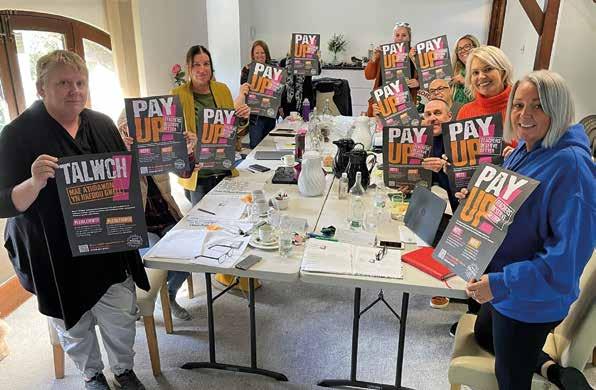

Fiaz Rashid, below, teacher, learning officer, international solidarity officer, regional council officer and Black organising forum member, Yorkshire and Humberside
“Nobody wants to strike. When I trained as a teacher in the 1990s it was because I believe in the power of education to transform lives, and I see this same desire reflected in the vast majority of my fellow educators. That so many of my colleagues now see strike action as a necessary course of action to raise public awareness of the desperate state of the profession is a terrible indictment of society.
“I believe we are doomed if we do not value those of us whose vocation is to impart learning to the next generation. Teachers’
pay, conditions and standards have been steadily eroded for decades and we now find ourselves devalued by our employers and denounced by the media. The profession is at breaking point and unless we are to condemn future generations to a second- or third-rate education, we must act now.
“Only by celebrating and valuing the contribution that teachers make to society will we make it a profession of choice. I believe that a teachers’ strike is massively undesirable, but absolutely necessary.”
Harriet Prescott, left, art teacher, Newcastle
“The cost-of-living crisis has affected me massively. Even though I am a fulltime teacher, my children still live in poverty because I don’t earn enough to cover our basic needs such as childcare or the car. Even the price of nursery has increased by a third.

“It feels like there is no escape from it and it closes in on you without you realising. You might think one week you’re ok, but then energy bills go up and suddenly you haven’t got anything left in the bank.
“It’s affecting me massively and right now there is no way to make ends meet without raising our wages. We need more
money. Otherwise we’re going to get to a crisis point where everyone will leave the profession simply because they are unable to survive.”
Liam, right, primary teacher, north-west England
“I’m a father and a husband who supports a young family. As well as teaching five days a week I also work over the summer in an agricultural role, on Saturdays as a barman and over winter I’ve also worked as a mental health support worker.

“Even working three part-time jobs alongside my profession, my family is still only just about managing. Something has to change. I’m the most qualified of my peers with the most student debt but I still earn considerably less than most of them. In addition to this, work as a teacher is precarious, with many teachers I know bouncing from maternity contract to maternity contract.
“Everything around teaching is wrong in a way and even the application process feels designed to dissuade people from applying. I recently decided to apply for a different role outside of education and was surprised that, for a job which pays more than teaching, all I had to do was submit a CV.
“I can’t honestly say teaching is worth it in the current climate.”
Faye Curran, overleaf, secondary science teacher, NEU rep and young teacher’s officer, Essex
“I’ve been a teacher for six years and I’m passionate about what I do. When I started my degree I had this idea that when I became a teacher, over a period of years, teachers’ continued on page 33
staff deserve better
educate Your magazine from the National Education Union (NEU) 31 support
Feature
Activists and reps get ballot-ready with NEU Pay Up posters in London (far left) and Wales (left)


Starting a family? Welcoming a new addition to your family is exciting but it can also be a time of work and financial worries so it’s more important than ever that you have the protection of your union. If you have a question about your maternity or parental rights or pay, contact your local rep, the NEU AdviceLine or take a look at our comprehensive guide to maternity rights at neu.org.uk/maternity Please note: subscription holidays for maternity, parental and adoption leave can only be processed in the current subscription year (1 September 2022-31 August 2023). We are unable to backdate requests for previous subscription years. To find out more visit neu.org.uk/neu-membership-rates Did you know that members on maternity leave, shared parental leave, or adoption leave do not have to pay membership fees? NEU1958/0822
continued from page 31
financial position would get better. But although I’m about to go up to the next point on the pay scale – and am reaching the end of the main pay scale – my living situation is not improving. In fact, it’s getting worse and that feels very demotivating.
“It’s scary to think that the cost-of-living crisis is affecting people so much that teachers are leaving the profession. What are schools and teaching going to look like in ten years’ time if people can’t afford to be teachers?”
Colleen Johnson, left, NEU executive seat holder for disabled members
“We all know that disabled people incur more costs than nondisabled people.
“The serious hikes in food, fuel and energy prices have serious consequences for us. Mobility aids need to be kept charged and rooms kept warm if people are to maintain their independence and avoid the worst consequences of their impairments. Disabled members should absolutely vote Yes for industrial action regards the derisory pay offer.”
Pablo Phillips, above centre, primary teacher and joint district secretary, Waltham Forest NEU
“I’m voting Yes in the pay ballot to strike because, as a disabled person, the cost-ofliving crisis and the cut to our pay has created an atmosphere of hostility towards disabled people. I’m voting Yes to be part of a collective expression of power and liberation.”
Charmaine Lee, left, primary teacher, Black representative and Black educators’ conference committee member, Kingston upon Thames
“The cost of living has already risen and my pay packet does not cover all of my necessities, let alone my travel-to-work costs and school
resources. I have worked hard to navigate my teaching career path with very little support, so to find that I am still paid below inflation is both upsetting and unacceptable.
“Collective voices equal power. The more we stand together the clearer the message: pay us what we deserve, it’s about time.”
Vik Chechi-Ribeiro, above right, secondary school teacher, Manchester NEU president and member of NW Black organisers’ forum, Manchester
“I’m voting Yes in the pay ballot to tackle the recruitment and retention crisis engulfing our education system. Training places remain unfilled, significant numbers leave within five years, and experienced teachers are deciding the hours worked in the classroom are not worth the pay. This is having a knock-on effect on the quality of education, workload and class sizes. Enough is enough.
“It’s not right most teachers are facing a seven per cent real-terms pay cut while energy companies stand to make £170 billion in excess profit over the next two years.
“I’m therefore proud to stand alongside teachers, support staff, transport and communication workers, university staff and others prepared to take action so we are not driven into poverty.”
n It’s time to fight together for the Government to pay up. Visit neu.org.uk/pay/pay-campaign


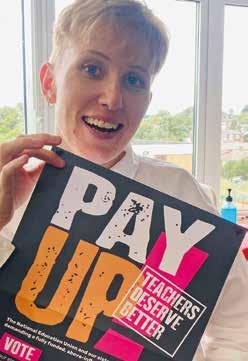
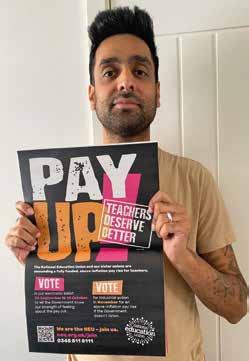
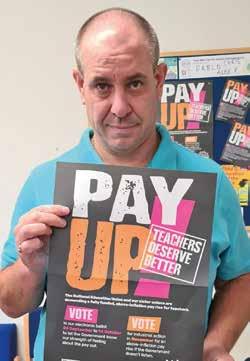
educate Your magazine from the National Education Union (NEU) Feature
33
(From left) Faye Curran, Pablo Phillips and Vik Chechi-Ribeiro
“What are schools going to look like in ten years’ time if people can’t afford to be teachers?”
Faye Curran
If your ballot doesn’t arrive, please email ballotenquiries@neu.org.uk










It would ensure our pupils come to class with full bellies, excited to learn. Join 100+ MPs, mayors, charities and medical bodies calling for Free School Meals for All. Extending Free School Meals to all children in primary would ease the pressure for every family. MILK BREAD CHICKEN MORE THAN IN 2021 MORE THAN IN 2021 MORE THAN IN 2021 PARENTS AND EDUCATORS HAVE NEVER HAD IT TOUGHER freeschoolmealsforall.org.uk/take-action +51p ADD YOUR NAME +17p +18p
The creeping growth of Oak’s curriculum
Oak won plaudits for being a useful free online learning platform.
But the organisation has now morphed into something much bigger, having been relaunched as a Government quango this autumn with £43 million of funding over three years and seemingly a main brief now as a curriculum body.
quiz”, with the slides suggesting this was because this had worked well in Oak’s pandemic incarnation.
WILL it be a help to hard-pressed schools and their teachers – of particular use where there are shortages of expert professionals – and an aid to cutting staff workload?


Or is it a dangerous example of Government overreach: an attempt by an ideologically minded Department for Education (DfE) to get right into the detail of teaching, which has damaging implications in terms of its potential to deprofessionalise classrooms?
This is the debate at the heart of the extraordinary rise of Oak National Academy.
Established quickly in 2020 after Covid hit, by teachers with strong representation from the multi-academy trust sector and subject to emergency Government funding,
Surveying materials put out by Oak, I am not alone in being staggered by its scope. The DfE has stated that Oak will: “Offer full curriculum packages consisting of curriculum maps outlining a curriculum across an academic year, setting out the units of learning, the key learning within each unit, and the sequence of this learning; and full sets of lesson materials for each subject.”
Oak is now proposing the development of thousands of off-the-shelf lessons, to be built by commercially contracted “suppliers”, to be available to schools in 2024.
Perhaps most extraordinary of all is the approach’s proposed rigidity. According to slides produced as part of Oak’s supplier “market engagement”, each lesson will follow the format “quiz; slides; video; worksheet;
Oak says all this will be entirely voluntary – and useful. But concerns have been expressed by experienced staff about offthe-peg lessons not being what they went into the classroom for. Oak has also come up with a set of curriculum principles which seem to have had no consultation, in the context of what seems to be a Government-friendly, arguably conservative-leaning outlook in the organisation’s set-up and philosophy.
NEU joint general secretary Kevin Courtney described the move as a “serious mistake” which would undermine teacher autonomy. Sir Jon Coles, head of England’s largest academy chain, has stated it was “wrong for the Government to develop a preferred lesson-by-lesson curriculum at all”.
Will it succeed? There has been a fair amount of Twitter talk of resistance from professionals. Whatever happens, in my view this is one of the most significant recent developments in education policy to watch.
educate Your magazine from the National Education Union (NEU) 35
Warwick Mansell is a freelance education journalist and founder/writer of educationuncovered. co.uk
n See page 16
OpinionCartoon by Tim Sanders
Ask the union
School won’t replace my broken glasses
MY prescription glasses were broken by a student. Apparently, the excess of the school insurance is too much, so I will not receive money to replace them. I am unable to see properly and am getting headaches.
This is an unreasonable position for the school to adopt. You urgently need to get the glasses replaced as not having them is impacting on your health, welfare and ability to work and live your normal life.
Regardless of the insurance policy, no member of staff should be out of pocket following actions by a pupil. If the school says it is not worth submitting an insurance claim, then the costs should be covered by the school. If the school still won’t budge, then seek further support from your rep or district.
You may also be covered by the NEU’s insurance for members. Under this policy, members’ glasses are insured up to £1,000 (with an excess of £25).
n Visit neu.org.uk/insurance
How soon can I leave my job?
I’ve started a new job but am very unhappy. What happens if I leave the school without working my notice?
This is a difficult situation to find yourself in, as many employment contracts with schools include notice provisions of two or three months. However, as you have just started a new role, your initial months may be subject to a shorter notice provision during a probationary period, so check your contract.
If you are subject to normal notice periods, you could ask to be released early.
Some employers may agree to release staff at half term, and knowing that you will only be working there for the next few weeks – rather than three or four months – may make your difficulties more bearable.
If they will not agree to release you early and this is impacting on your health, you might seek medical advice as to whether you are well enough to keep attending.

Homophobic and sexist language going unchallenged I’VE just started my first teaching assistant job in a primary school and am really concerned about the homophobic and sexist language I hear from children, which often goes unchallenged by the teacher. I’d like to know what I can do.
Homophobic and sexist language needs to be challenged on an ongoing basis and it’s great you are thinking about how to do this.
Start by mentioning to the teacher what you have noticed – they may be unaware of the language or comments. Ask what approach the school is taking around preventing and responding to homophobic and sexist language and stereotypes.
The classroom presents lots of ways to help you and colleagues address homophobic and sexist language for each year group.
For younger students, the use of stories to develop a sense of empathy is key. With older students, having open conversations exploring the meaning of the negative stereotypes helps to develop an understanding of the impact homophobia and sexism can have on others.
n Every Child, Every Family provides ideas about how to build LGBT+ inclusion through reading. Visit neu.org.uk/media/7601/view n It’s not OK is the NEU’s new toolkit to challenge sexism and sexual harassment. Visit neu.org.uk/end-sexism-sexual-harassment
Email educate@neu.org.uk
Free CPD webinars for all NEU members
NEU members have exclusive access to our continuing professional development (CPD) webinars. Here are some of the courses coming up.
Having difficult conversations
Interactive online workshop considering why some conversations are challenging and exploring key communication skills. Aimed at middle and senior leaders, you will leave with a toolkit of strategies to help you deal with difficult conversations. 15 November (part 1) from 4-5.30pm 24 January (part 2) from 4-5.30pm
Using curiosity and wonder to engage learners
Author and speaker Dave Harris will introduce you to the neuroscience that lies behind curiosity, and show how you can use a variety of items of curiosity and wonder to engage learners. For educators working with young people of any age.
16 November from 11am-12.15pm
Introducing leadership and management in education
Exploring the relationship between management and leadership in education,
and then looking at the skills needed for both and an analysis of some different models of leadership and management.
Suitable for leadership or aspiring leadership members.
22 November from 3.45-5pm
n Webinars are recorded and made available for seven days afterwards for those who have registered, to view at a convenient time.
n To book or for more information, email cpd@neu.org.uk or visit neu.org.uk/national-cpd
36 educate Your magazine from the National Education Union (NEU)
IMAGE by fizkes
A class act
‘Our fight is not in a silo’
Naoise McGeer-Letson (pictured) is head of art, a joint NEU rep, and making strides in LGBT+ equality issues in her workplace. Sarah Thompson finds out what makes her a class act.

NAOISE had no intention of becoming a teacher. Her own experience at school was not a positive one. “I hated it,” she says, “and I didn’t do very well.” But she loved art, and an ambition to work in art galleries as an education officer led her to do a PGCE.
“I knew immediately that I’d found what I wanted to do for the rest of my life,” she recalls. “I absolutely loved it from the first day.”
She followed a well-trodden path into leadership, becoming an assistant head teacher. But after seven years she returned to the classroom, motivated by a desire for a better work-life balance and keen to get back to teaching. In September, she became head of art at George Green’s School in east London.
A universal language
“It’s really nice to teach lots of classes and do the fun, creative stuff, designing the curriculum again,” she says.
She has introduced an issues-based curriculum – current affairs and social topics are used as a springboard for discussion, research and creative exploration. One scheme of work on protest encourages students to think about how art has been used to inform and persuade, and looks at techniques such as printing and its use for posters and rallies.
“I talk to students about art being a vehicle for communication – a universal language,” says Naoise.
“It’s a way for people to express themselves and to understand how other people have expressed themselves throughout moments in history. We talk about the Free Derry wall in Northern Ireland and how that’s been used by different groups of people, including LGBT+ groups and Black Lives Matter, to promote equality.”
She has created an arts curriculum that is inclusive and represents the wider community, including Black, LGBT+ and disabled artists.
“Historically, art education has been very much about old dead men,” she says. “We teach about the wealth of people from different communities that make art, so
that students can see it reflected in their own experience.”
Equality and diversity issues are close to Naoise’s heart. As an LGBT+ educator, she has experience of the considerable challenges it can present and says that the legacy of Section 28 (which prohibited the ‘promotion of homosexuality’) is alive and well.
“Lots of us work in schools where it is unclear what you can and can’t talk about,” she says. “In the past I’ve signed documents to say I won’t discuss my private life. It’s challenging, especially for new teachers.”
Naoise’s previous school had an emphasis on LGBT+ inclusivity, with representation on the leadership team and a Pride group for students. It gave her a clear idea what an inclusive workplace should look like and the confidence to be open about her LGBT+ status.
“I wear a rainbow lanyard and tell students I have a wife and child because I think it’s important,” she says. And it means
she is visited often by students and other colleagues who need someone to talk to and, importantly, she says, “are looking for a community”.
In July, Naoise attended the TUC LGBT+ workers’ conference, an experience she describes as “the most rallying and important one I’ve had”. It was eye-opening, she says, to hear from educators working in very challenging environments.
Knowledge and friendships
She has since become the joint NEU rep in her school and has submitted a proposal to the senior leadership team for support systems for LGBT+ students and staff. The support of NEU LGBT+ members has been crucial, she says.
“I feel armed with the knowledge to support myself and my peers in our challenges as LGBT+ people in the workplace. I am armed with the knowledge that our fight is not in a silo but extends to our union siblings. And, importantly, I have connections and friendships that will support me when those challenges feel like a mountain.”
educate Your magazine from the National Education Union (NEU) 37
Do you know a class act?
Email educate@neu.org.uk
“I wear a rainbow lanyard and tell students I have a wife and child. I think it’s important.”
Naoise McGeer-Letson

educate Your magazine from the National Education Union (NEU)38
IN Colombia, national elections have brought renewed hope for the peace process, human rights and social justice.
On 7 August, Gustavo Petro was inaugurated as the new Colombian president, the country’s first leftist head of state. The new vice-president is Francia Márquez, the first African-Colombian woman to hold the role.
President Petro will lead a coalition Government, the Historic Pact, drawn together from a broad group of progressive parties that received strong support from
Colombian election result brings renewed hope for peace
young people, women, ethnic minorities, trade unions and the pro-peace movement.
Immense challenges lie ahead for the new Government. Implementation of the peace agreement is a key priority; land reform and social investment are also key components of Petro’s agenda.
Justice for Colombia, established by the British trade union movement to support

Pakistan floods displace millions
TENS of millions of people in Pakistan are facing a humanitarian emergency following unprecedented floods.
A million homes have been devastated and 45 per cent of agricultural land has been destroyed. At the height of flooding, one third of the country was underwater. The death toll has neared 1,500, but the true loss of life will be incalculable for some time.
Prior to the floods, 23 million children in Pakistan did not go to school, and now millions more stand to lose out. According to officials, almost three million will miss at least one school term of learning.
Across the country, school infrastructure has been battered. At least 18,000 schools have been damaged or destroyed, several thousand are unsafe, and a further 5,500 have been requisitioned to house the displaced.
n NEU districts and members can provide vital solidarity by donating to Disasters Emergency Committee’s Pakistan floods appeal at dec.org.uk/appeal/pakistan-floods-appeal
Colombian civil society, stated: “International support will be crucial to helping the new Government meet the urgent needs of the Colombian people.”
Senator María José Pizarro, president of the Women’s Commission in the Senate, met with NEU representatives during her visit to Labour Party Conference in September (pictured above).
22 million on brink of famine
THE Horn of Africa is facing an unprecedented humanitarian emergency with 22 million people at risk of starvation across Ethiopia, Somalia and Kenya as the region experiences severe drought.
Climate change is driving extreme weather in the region, killing crops and livestock that families rely on. Access and affordability are key challenges, with prices for food and fertiliser soaring – a problem exacerbated by the war in Ukraine, which has driven up food prices and diverted vital financial aid. With a fifth consecutive failed rainy season predicted from October to December, the region’s worst drought in 40 years is expected.
Globally, 345 million people are estimated to be in ‘hunger emergencies’ – defined by the UN as one step away from famine –while aid agencies warn that the target to end world hunger by 2030, endorsed by 193 countries, is more distant than ever.
n Donate to Save the Children’s East Africa hunger crisis appeal at savethechildren.org.uk
International
Senator María José Pizarro (centre) at a Labour Party conference fringe meeting
PHOTO by Jess Hurd
educate Your magazine from the National Education Union (NEU) 39
Need inspiration? Just ask your pupils
WE’RE continually looking for ways to give our pupils more ownership of their school reading culture.
After a Covid-enforced gap of more than two years, we’ve recently restarted our school reading council. Each of our nine classes nominated someone to talk about their love of reading and suggest ideas about ways to spread that passion across the school.

The first ten minutes of the meeting were spent chatting about our favourite books. The children were in mixed-age groups and, although some of the younger children were quite nervous, it was wonderful to see how empathetic and supportive the older pupils were, asking thoughtful and sensitive questions about the chosen books.
The discussion then moved on to sharing what each class already did to promote reading for pleasure. Story time, independent reading and book talk have been firmly embedded in the school for a while now, but it was reassuring – and heartening – to hear how many classes had taken on other initiatives such as poem of the day, reading scrapbooks and the pupil recommendations shelf, some of which I’ve written about in previous Educate articles.
Reading rollercoaster
The main part of the meeting focussed on new ideas for raising the profile of reading even further.
I was genuinely stunned by their passion and creativity, with some wonderfully original suggestions being put forward – although, unfortunately, they weren’t all practical. I haven’t checked, but I suspect that inviting JK Rowling to read Harry Potter during assembly might stretch our school budget very slightly, and I’m not sure that building a reading rollercoaster on the field, where the children have to grab handfuls of books on their way down, would pass health and safety checks. I’d be more than happy to be proved wrong.
Some of the more realistic suggestions included organising a special reading assembly where every child and member of staff would bring a favourite book to talk about in small groups; training up some younger children to be library assistants when their class visits the library; and running a half-termly book swap and expanding it to include parents. What fantastic suggestions.
There was also talk of introducing a reading day, where a range of books and authors would be celebrated in different classrooms, with the children being given the option of where they’d like to go.

A funding premium for books

Items on the agenda for the next meeting include a discussion about which author, poet or illustrator we’d like to visit us next term; how we’re going to celebrate World Poetry Day in March; and which biscuits to provide when we open the library for parents.
On a related note, the current funding situation in schools has already reached critical levels, with schools across the country being forced to cut back on everything, including books. This saddens me for so many reasons.
We know reading for pleasure has an enormous impact on a child’s educational success. An investment in reading material has to be looked at in terms of the returns and not in terms of the outlay. Money is rightly put aside for the PE and sport premium, so it’s about time that something similar was introduced for reading.
We can’t afford to buy books… and we can’t afford not to.
@jonnybid
Reviews
(Left) Some favourite books we shared
(Below) Swapping ideas at the school reading council
Jon Biddle, English lead and NEU rep at Moorlands Primary in Norfolk, is passionate about fostering a love of reading for pleasure. Here he shares ideas and tips for schools to try.
Read more ideas from Jon next issue
educate Your magazine from the National Education Union (NEU)40
Know any good educational websites and apps?
Let us know if you’d like to review them –email us at educate@neu.org.uk
The Expert Teacher
AS the author himself states, this is not a book for those new to teaching or looking for a quick fix. This is a book for those wanting to fine-tune their craft and explore pedagogy in more detail.
Darren Mead has spent his career trialling and refining his practice and is keen to empower others with what he has learnt.
Over six chapters he unpicks the skill of teaching and explores the need for well-thought-out and meticulously planned lessons. Spend the time, add the detail, think it through and only then will you see the positive effects in learning.
Sian Sparrow
The Expert Teacher: Using Pedagogical Content Knowledge to Plan Superb Lessons by Darren Mead. Crown House. £18.99.
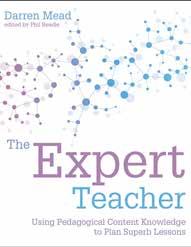
Great Relationships and Sex Education
A USEFUL resource providing more than 200 practical ideas for delivering great relationships and sex education (RSE) lessons. It takes the stress out of planning as each themed chapter has almost 30 activities outlined, alongside a summary of the resources needed, the time it takes and the target age group.
Lesson styles vary ranging from drama, quizzes and art, to small-group work and individual reflections. The activities can be linked across the curriculum.
There are also websites with useful resources for educators to download and use within the classroom. A handy time saver.
Cindy Shanks
Great Relationships and Sex Education by Alice Hoyle and Ester McGeeney. Routledge. £34.99.

The Teacher Journal
WRITTEN by experienced teacher Naomi Barker, who has a background in PGCE training, this journal is a supportive and reflective tool for early career teachers (ECTs).
The structure follows the weeks and terms of the school year with suggested tasks and activities to focus new teachers on their practice. Space is provided for reflections where ECTs can outline their achievements and progress towards teacher standards, as well as celebrating key highlights of the week such as favourite student quotes.
Although some areas are geared towards a secondary structure, there is still plenty to support primary practitioners. The importance of wellbeing and self-care is woven throughout.
Sian Collinson
The Teaching Journal by Naomi Barker. Bloomsbury. £14.99.
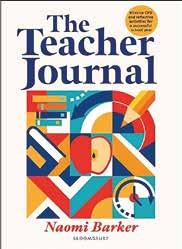
About Our Schools: Improving on Previous Best
WHAT has been the impact of education throughout history and how has it evolved? In this informative book, the authors address the shift in educational policies from the 1970s to the present day.
Using extensive research, this book seeks to explore the past and enhance the educational chances of all children. It provides suggestions for how the school system can be improved upon, with six foundation stones and 39 steps for achieving this.
A thought-provoking book and an inspirational read.
Cindy Shanks
About Our Schools: Improving on Previous Best by Tim Brighouse and Mick Waters. Crown House. £24.99.

Fire Burn, Cauldron Bubble: Magical Poems
COMPILED by Paul Cookson, this hardback anthology contains 72 enchanting poems. Brightly coloured with eye-catching illustrations, it exudes quality.
Featuring famous, traditional poems (by Lewis Carroll and William Shakespeare), as well as contemporary poets (Brian Moses), there is a selection of poetic styles to suit all tastes. Some poems are hilarious – for example, I Once Asked a Wizard – while others, such as The Forest, are spine-tingling.
A lovely book for teachers to dip into at the end of the day to share with their class, or for children to enjoy independently. Ideal for children aged seven upwards.
Cindy Shanks
Fire Burn, Cauldron Bubble: Magical Poems chosen by Paul Cookson and illustrated by Eilidh Muldoon. Bloomsbury. £12.99.

educate Your magazine from the National Education Union (NEU) 41
I WAS surprised that the article
Why signing is preferable to lip reading vocalisation? Sign language can be understood by both parties.
Hands Up! to improve deaf awareness (Educate, September/ October, page 50), only mentioned lip reading and not sign language.
There are several reasons why the latter is preferable to the former when interacting with deaf students.
Some of the reasons are:
n Fewer than half of English words can be read on the lips. Poor light, facial hair and mumbling are other negative factors.
n Even if the deaf student can lip read the teacher, how do they respond if they have no clear
n Signing has its own rules, which enables deaf people to communicate more easily with each other. This is not true for lip reading.
Now of course provision of signing in the classroom costs money. Ideally there would be a trained signer available to the school. More efficiently, the teacher could be trained in sign language, perhaps alongside hearing-impaired as well as hearing students.
So perhaps training for teachers in British Sign Language
Through seemingly small actions in the classroom (such as moving around when speaking), poor deaf awareness accumulates, impacting academic success. In 2021, England’s deaf pupils achieved whole GCSE grade lower than hearing children on average, for the sixth year running. There are similar gaps in Scotland, Wales and Northern Ireland. In survey we conducted, one in three deaf students (31 per cent) said most or all of their teachers showed poor deaf awareness. This isn’t surprising though – research also shows two deaf pupil. This hits deaf students beyond the education system, as there isn’t equal access to career opportunities. The isolation can also affect their mental health. Compulsory training for teachers We’re calling for compulsory deaf awareness training for teachers; step towards closing the gap between deaf and hearing pupils. In March, our online petition asked the then School Standards Minister Robin Walker for this and it’s already
is a key component of the deaf awareness training mentioned in the article.
Ian Hollingworth, Thailand
Avoid divide and rule
AS a retired member and veteran of the early 1980s pay and conditions campaign, I read with interest that the NEU is balloting members for action in association with our sister union, the NASUWT.
I hope that unity is maintained throughout and any ‘divide and rule’ tactics by employers and others is resisted. The lack of strategic unity back in the Joseph/Baker era in many ways has led to the de-professionalisation, stresses and strains now faced by dedicated teachers.
John Tattersfield, Nottingham
‘Huge disservice to children’ when we lower EYFS data for wider benefit of school


I AM an experienced early years leader, and my reception team and I have just completed our first year working with the new early years foundation stage (EYFS) framework and profile.
I felt under immense pressure this year to play a data ‘game’ and consider outcomes at the end of key stages 1 and 2 when finalising endof-year judgements. This has led to our data being lowered considerably by the senior leadership team, despite the children concerned having attained consistently and independently what is necessary.
Children who were moderated by internal subject leaders and at external moderation events as being ‘expected’ were still pushed down
Teacher’s pet
Sarah says: “Athena is my twoyear-old cockapoo. She has a big personality and likes to work on her training drills (retrieving, recall and heel work).

“She loves long walks, siestas on the sofa, and is best friends with our school reading dog.”
If you have a treasured pet you’d like to show off, email a high-resolution photo with
words about what makes
special to educate@neu.org.uk
to ‘emerging’ at data submission for the wider benefit of the school.
I understand the external pressures on school leaders, but this is doing a huge disservice to the children and makes a mockery of the hard work put in by my team, the parents and the children. I feel angry that I have to ‘help out’ year 2 and year 6 colleagues (who are incredibly capable teachers) by lowering my data to make theirs look better later.
Is this issue limited just to my school or is this a problem that has been experienced more widely? Name withheld
Letters
50
them so
Meet Athena, the gorgeous pet of Sarah Cornish, an assistant principal of a primary school in
Kent.
Athena Final word Fact file Polly Button 17, is severelyprofoundly deaf student who uses two hearing on the National Deaf Children’s Society Young People’s Advisory Board. Visit ndcs.org.uk word Hands Up! to improve deaf awareness STUDENTS everywhere are battling to catch up on what they missed during the pandemic. They’re also getting ready for some of the biggest educational milestones they’ll face. As a deaf student, this can be even harder. Two thirds found online lessons difficult to understand during lockdown. When we returned to school, face masks made lip reading impossible and facial expressions so much harder to read. Deaf children were already at disadvantage. Did you know deaf children achieve less than hearing children at every stage of school? It’s because there’s real lack of support. I’m part of the National Deaf Children’s Society (NDCS) Young People’s Advisory Board –18 deaf young people campaigning for the UK’s 50,000 deaf children and young people. We’ve chosen “improving deaf awareness in education” as our priority and called the campaign Hands Up! this was because we’d all experienced poor deaf awareness in the classroom. If it’s common in small group, how many are suffering across the UK? Too many. Education is right, not a privilege, yet the lack of deaf awareness training in schools means deaf students miss out. Meeting pupils’ communication needs Deaf awareness is understanding how to include a deaf person and meet their communication needs in any situation. Poor deaf awareness in the classroom – like not facing the class when speaking or showing videos without subtitles – can be catastrophic. Yet with the right knowledge, it’s easily prevented. It’s important to remember, however, that no two deaf people are the same and what works for one might not work for another.
passed 80,000 signatures. We’d like to see compulsory deaf awareness training in initial teacher training and regular follow-up training sessions. This can ensure all deaf pupils are included in the classroom, helping them achieve their full potential. Currently only three per cent of teachers feel their teacher training gave them the information they need to meet deaf pupils’ needs. Deafness isn’t learning disability, so improving access to lessons can help deaf pupils thrive in class. This will be significant step in breaking down the barriers deaf children and young people are currently facing in schools, improving the lives of 50,000 across the UK. The NDCS Roadshow at the Guildhall in London PHOTO by Amit Lennon Photography “Poor deaf awareness in the classroom can be catastrophic, but it is easily prevented.” 42 educate Your magazine from the National Education Union (NEU)
of the sentence has to be named, scrutinised and pulled apart so that it can be put together again in a way that is clinical and totally unimaginative.
How many writers sit and check through their writing to make sure that it has fronted adverbials, relative clauses and subordinating conjunctions; that it is written with figurative language and that there is a


reading is either as a whole class activity or an adult led activity.
Suzanne’s experience really resonated


THE article Vive la différence (Educate, May/June, page 28) changed my view of myself as a neurodivergent teacher and individual.
I completely identified with all the women who contributed to the article, particularly Suzanne (below). I am autistic, but like Suzanne I was undiagnosed until adulthood. I gave up my teaching role for mental health reasons, before I was diagnosed, but I still work in education and am fortunate to have a very supportive workplace.

Please write The editor welcomes your letters but reserves the right to edit them.
Write to Letters, Educate, NEU, Hamilton House, Mabledon Place, London WC1H 9BD or email educate@neu.org.uk
Grammar and MFL WARWICK Mansell questions the usefulness of SPaG (spelling, punctuation and grammar) learning at the end of key stage 2 (Educate, July/August, page 37).
As a modern foreign languages (MFL) graduate who has worked as a speech and language therapist, an English as an additional language progress

A review of the balance should be called for and the people who actually teach the subject should be surveyed. We have all found that a child can score a high grade on a SATs test but be incapable of producing a cohesive piece of writing. Something is clearly wrong.
Al Rhodes, Staffordshire
mentor, and is due to begin initial teacher training in MFL in September, I wish to stress how helpful an understanding of one’s own grammar can be when coming to other language learning or English language/linguistics studies, and for any career involving work with language learners or those with communication needs.

Nic Martin, Leeds
Bring the fun back for MFL
Please note we cannot print letters sent in without a name and postal address (or NEU membership number), although we can withhold details from publication if you wish.
I still find it difficult to ask for help. Sometimes I don’t know what would help, or how anyone could help. Masking is a very real thing, and while it is definitely a coping strategy, it also by its nature leads to poor selfknowledge and, for me, extremely low self-esteem.
Let’s look after our staff the article You are the experts after all (Educate, September/October, page 11) and was totally inspired by the head teachers who are able to balance the demands of the job but still look

It was very affirming to read the article and I hope others felt the same.
Dawn Johnson, Sheffield

Update your membership details – visit my.neu.org.uk


IT’S vital that the NEU has up-to-date details for all its members. You may be eligible for reduced subscriptions – for example, if you work part-time, are about to retire or take maternity leave.
It’s important that we have the correct address for you for balloting purposes so, if you have moved, make sure you tell us your new home or workplace address.
I AGREE with Nic Martin (Educate, September/October, page 43). I have been a modern foreign languages (MFL) teacher for 40 years and cannot emphasise enough how important grammar is when learning and appreciating a foreign language. It also works in reverse – foreign language learning helps improve structure, understanding and logic in your own language.
I have just retired from teaching after 33 amazing, but at times very challenging, years. Teaching was my dream job, but I left feeling totally burnt out.
The easiest way to update your details is by logging on to myNEU. Go to my.neu. org.uk to manage your membership,

Recognising how language works enhances its enjoyment and simplifies learning. Knowing basic parts of speech makes language transferable skills so much easier. Perhaps if more emphasis was placed on enjoyment, uptake of MFL at GCSE would improve.
Jillian Hannah, London
Update
IT’S
including updating your address, workplace, and equality information. Alternatively: n call us on 0345 811 8111 (Monday to Friday, 9am-5pm) n email membership@neu.org.uk n or write to Membership & Subscriptions, NEU, Hamilton House, Mabledon Place, London WC1H 9BD.
Teachers need time to rest so they can go into the classroom with energy to enable them to teach dynamic lessons and inspire children. They need family time and a proper work-life balance. I’ve seen colleagues struggling with their partners who are not happy with the way the job consumes their life.
We want children to feel valued, but do we praise the staff who are in the classroom? I do recognise with the pressures of Ofsted how hard it is, but can we start with small steps, like a weekend without emails, ensuring staff meetings finish on time, praising staff and having staff meeting surgeries where staff can share ideas, time-management tips and planning.
Let’s look after our staff so they can continue to have a positive impact on our future generation.

Christine Shelton, Loughborough
–
including updating

Alternatively: n call
n email membership@neu.org.uk n or


Mabledon
WC1H 9BD.

educate Your magazine from the National Education Union (NEU) 43
your membership details
visit my.neu.org.uk
vital that the NEU has up-to-date details for all its members. You may be eligible for reduced subscriptions – for example, if you work part-time, are about to retire or take maternity leave. It’s important that we have the correct address for you for balloting purposes so, if you have moved, make sure you tell us your new home or workplace address. The easiest way to update your details is by logging on to myNEU. Go to my.neu. org.uk to manage your membership,
your address, workplace, and equality information.
us on 0345 811 8111 (Monday to Friday, 9am-5pm)
write to Membership & Subscriptions, NEU, Hamilton House,
Place, London
NEU members can take advantage of a wide range of deals including*: • gym membership • mobile phones • dining out and takeaways • cinema tickets • magazine subscriptions • travel and holidays • discounts at high-street retailers neu.org.uk/neu-rewards *Special offers change regularly, so be sure to check for the latest deals. Visit: or sign up to the myRewards newsletter to get the latest deals by email. NEU joint general secretary Mary Bousted talks to a head teacher whose teachers and pupils thrive due to a culture of praise, practise, respect and rest. IMAGINE asking a head teacher how they treat the staff in their school and receiving this answer: “Our pupils live challenging lives in disadvantaged circumstances. They need the highest quality teaching, with experienced teachers who can help and support their newer colleagues. I believe teachers need space to practise teaching – not everything they do will work. “The classroom is a very insular place, so teachers need space to talk, to learn and to develop without fear. Teachers need the opportunity to develop personally and as teacher; they need to practise their craft. “How often do we say ‘well done’ to teachers? We must trust teachers to do what they can for their children between 9am and 3.30pm. We must trust them to work hard, and we must give them adequate rest. “For teachers with families, the weekend is sacrosanct because they work so hard in the week. We must respect that.” Happy, well-rested teachers You might think that I am imagining this answer – but am not. It was given to me by Robyn Bruce (pictured), the head teacher of Cubitt Town Junior School (CTJS) in Tower Hamlets, London. Job adverts for teaching posts at CTJS make a rare appearance, but when they do candidates are told that the school’s leadership “passionately believes that happy, well-rested teachers make for good teachers. We therefore take the wellbeing of our staff very seriously and ensure that all of our teachers maintain a healthy work-life balance.” Of course, such statements are easy to make, but in an NEU meeting Cubitt teachers told me that they did feel valued and trusted to get on with their work. Appraisal is not linked to numerical targets – that was abandoned because Robyn realised how unfair and punitive this approach was. Instead, teachers work on research projects aimed to improve their practice and the work of the school, and these are presented to the whole staff on an Inset day. Teachers plan in pairs or threes, and observe each other on areas where one feels that they need support and help to improve. As the school’s mission statement says: “We pride ourselves in providing an environment where teachers have the freedom to teach and to grow – you are the experts after all.” Calm, friendly classroom atmosphere Going round the school was struck by the calm, friendly atmosphere in each classroom. There is a great emphasis on oracy – speaking and listening for learning, and for debate and public speaking. I saw year 5 and 6 pupils in an oracy lesson debating with each other using impressive vocabulary and phrases, naturally and effectively expressing their ideas and making their points. It was wonderful to see the skills they employed and the enthusiasm they shared as they debated with one another. NEU members, in an after-school meeting, told me of their experiences of being heard and having their views and opinions respected in discussions about teaching, learning and much more. They are expected to contribute to curriculum development and policy making. The school development plan is jointly written with all staff, so that everyone has strong sense of its ownership and firm commitment to achieving its aims. Belief in the value of their work Everyone spoke to at CTJS emphasised that things are not perfect. There are always ways to improve their working lives and the education they give to their pupils. NEU members told me that they work very hard –as all teachers do. The difference is that they believe the work they do is important and valuable. It is work done to improve teaching and learning and to support their pupils –many of whom have additional needs. We need more of this good work for the profession, and more schools, like CTJS, where it can thrive. n See page 22 Opinion ‘You are the experts after all’ educate Your magazine from the National Education Union (NEU) 11 Head teacher Robyn Bruce (left) and Mary Bousted at Cubitt Town Junior School PHOTO by Sarah Turton educate Your magazine from the National Education Union (NEU) 43
Viva La Educación is a joint appeal by the NEU and the Cuba Solidarity Campaign to provide essential educational resources for Cuban schools.

Cuba’s achievements in literacy and further education compare well with others in the region. However, students often have to make do without the basic classroom necessities that we take for granted, and teachers face difficulties obtaining materials to help them plan, teach and share lessons due to the cruel 60-year-old US blockade.
SUPPORTING EDUCATION, RESISTING THE BLOCKADE

Find out how you can support and donate to Viva La Educación at vivaeducacion.org.uk

EDUCATIONAL AID FOR CUBA

M USIC FUN D FOR CUBA
Fascinating history workshops
THE Marx Memorial Library – home to extensive archives on the workingclass movement, the history of anti-fascism, the peace movement, campaigns against racism and sexism and much more – is taking bookings for school tours and workshops for 2022 and 2023.


Set in a historic building in central London with a fascinating history in its own right, the workshops are ideal for GCSE and A-level students of history and politics, and groups who would benefit from hands-on access to historical sources.
The library would also like to hear from
primary and secondary school teachers who are interested in informing the development of a new library strategy broadening and widening its engagement with schools. n Visit marx-memorial-library.org.uk
Take action on climate change
CHARITY Weather Watch is empowering children to turn their eco-anxiety into action and have a say in shaping a sustainable future.


Founded by polar explorer Sir David Hempleman-Adams, the charity offers free workshops and can organise school visits from explorers and scientists on climate
and sustainability. Downloadable teaching resources look at the impact of climate change on the polar regions and link that to children’s experiences in the UK with ideas about how they can take impactful steps to protect the planet.
n Visit wickedweatherwatch.org.uk
Share your experiences of the menopause for new book
HOT flushes, mood changes, brain fog, nausea? Charity Period Power is asking women to share their experiences, advice and thoughts on the menopause for a new book, All Things Menopause.
Contributions can be in the form of a short story, poem or artwork, and can be anecdotal, informative or humorous.
n Email your contributions to periodpower 2017@gmail.com by 30 November.
Learning to act justly EMPATHY Action is a group of volunteers who believe that to really understand another person, you first need to walk in their shoes.
The group has created The High Life, a free, interactive, film-based climate justice simulation. It tells the story of two countries, Opuland and Ardosland, offering participants the chance to see for themselves how everyday decisions made in one part of the world have global consequences for people living on the frontline of the climate emergency.
Schools are encouraged to make an optional carbon-offsetting donation. n Visit empathyaction.org
Ask Audrey for literary guidance
NEW guided audiobook app Audrey is offering teachers and students free access to any books on the curriculum. Audrey pairs works of classic fiction in audiobook form with an expert literary guide who provides cultural and historical context, insights into the author’s life, commentary on the literary devices at play, related videos and podcasts, and a playlist for the book.
Audrey’s library is fast-growing, from The Great Gatsby guided by journalist and academic Rosa Inocencio Smith; to Dubliners guided by Joyce scholar Sophie Corser; and The Picture of Dorian Gray guided by author and academic Nat Reeve.
Each book comes with character descriptions and chapter recaps. n Visit listenwithaudrey.com
n If you’d like to suggest books for you and your students, email rob@readwithaudrey.com
Noticeboard educate Your magazine from the National Education Union (NEU) 45
PHOTO Marx Memorial Library
A Wicked Weather Watch workshop

Photo opportunity
THIS beautiful photo was taken by Elaine Eager, a teaching assistant from Shoeburyness in Essex.

Elaine says: “Children being children and just enjoying the sunset and the sea. This was a peaceful Sunday, one of those perfect evenings, and I was enjoying ‘me time’ with my camera before the madness of Monday. This is five minutes’ walk from my house and five minutes’ drive from the school I work in. A good place to be.”
If you are a keen photographer, why not send your pictures to us at educate@neu.org.uk
They should be large and high resolution, accompanied by 50 words about their subject. We send a £20 book token to each featured so don’t forget to pop your address on the email too.
in
1 onion,
mince
length of chorizo
1 carrot, cut into
of
chillies,
of
red pepper and 1 green pepper, cut into
sizes
tin of
beans
sweetcorn
and pepper
rice per person
fraîche and
powder
with a twist
1.
2.
the onion in the oil until tender. Add the mince
brown. Add the chorizo and cook for 2 minutes.
the carrot, stock, tin of tomatoes and chillies
cook for approximately 20 minutes at a gentle boil
the lid on.
the peppers and cook with the lid off to thicken the sauce for approximately 10 minutes.
3.
4.
the kidney beans and sweetcorn and cook with the lid on for approximately 10 minutes. Season to taste with salt and pepper.

5.
with approx 100g of rice per person cooked following the instructions on the packet. Garnish with a spoon of crème fraîche and a sprinkling of chilli powder.
educate@neu.org.uk with your name,
educate Your magazine from the National Education Union (NEU) 47
WIN! Send us your photo to win a £20 book token
What’s
your lunchbox? This delicious recipe for chilli was sent to us by Mark Montgomery, a special educational needs co-ordinator in Armagh, Northern Ireland. Chilli
serves 6 Ingredients
diced Olive oil 500g
beef 50mm
ring, sliced
thumbnail sizes 500ml
stock 400ml tin
tomatoes 2
chopped 1
thumbnail
400g
kidney
200g
Salt
100g
Crème
chilli
Method
Cook
and
Add
and
with
Add
Add
Serve
WIN! Send us your recipe to win a £20 book token Email your recipe and a picture of it to
address and membership number.
Across
West Bromwich ___ : football club (6)
Beekeeper (8)
___ : epic historical drama film (3)
of New York’s airports (6)
Son of Adam and Eve (4)
Campbell: British supermodel (5)
astronomer and author of the Almagest (7)
victory: a costly success (7)
Writer of fables (5)
Gallagher: former Oasis member (4)
Another name for Beethoven’s Symphony No. 3 (6)
value ball in snooker (3)
with large waxy flowers (8)
currency of Russia (6)
Kutcher: US actor (6)
largest island in the world (6)
___ : Spanish tennis star (5)
caused by vitamin D deficiency (7)
Iconic star of martial arts cinema (5,3)
naturally occurring chemical element (6)
state whose capital
Annapolis (8)
TV cook (7)
Servant in a noble or royal household (6)
Large beetle that was sacred in ancient Egypt (6)
Dog breed (6)
Grinding tooth (5)
York's
Adam
fables
supermodel
author of the Almagest
Oasis member (4)
for Beethoven's Symphony No. 3
in
or
household (6)
that was sacred in ancient
48 educate Your magazine from the National Education Union (NEU) Quick crossword
1
7
8 Ben
9 One
10
11 ___
13 Early
15 ___
17
21 ___
22
23 Lowest
24 Tree
25 The
Down 1 ___
2 Third
3 Rafael
4 Disease
5
6 Densest
12 US
is
14 ___Lawson:
16
18
19
20
Answers at bottom of page 49 1 2 3 4 5 6 7 8 9 10 11 12 13 14 15 16 17 18 19 20 21 22 23 24 25 Across 1 - West Bromwich ___ : football club (6) 7 - Beekeeper (8) 8 - Ben ___ : epic historical drama film (3) 9 - One of New
airports (6) 10 - Son of
and Eve (4) 11 - ___ Campbell: British
(5) 13 - Early astronomer and
(7) 15 - ___ victory: a costly success (7) 17 - Writer of
(5) 21 - ___ Gallagher: former
22 - Another name
(6) 23 - Lowest value ball in snooker (3) 24 - Tree with large waxy flowers (8) 25 - The currency of Russia (6) Down 1 - ___ Kutcher: US actor (6) 2 - Third largest island in the world (6) 3 - Rafael ___ : Spanish tennis star (5) 4 - Disease caused by vitamin D deficiency (7) 5 - Iconic star of martial arts cinema (5,3) 6 - Densest naturally occurring chemical element (6) 12 - US state whose capital is Annapolis (8) 14 - ___Lawson: TV cook (7) 16 - Servant
a noble
royal
18 - Large beetle
Egypt 19 - Dog breed (6) 20 - Type of grinding tooth (5) Sudoku 4 6 5 7 9 4 3 5 2 9 3 2 5 4 6 1 7 8 8 2 6 2 7 3 6 1 3 8 6 2 8 5 2 8 6 5 1 2 7 6 3 9 8 7 4 1 2 5 8 1 3 3 6 2 1 5 9 5 8 7 1 9 5 2 1 3 5 9 4 7 1 1 2 7 7 6 4 9 6 2 9 1 Easy Medium Difficult Sudoku solutions will feature on this page next issue. Last issue’s (Sept/Oct 2022) sudoku solution (from left: Easy, Medium and Difficult) 5 4 6 1 3 8 2 9 7 8 3 9 7 5 2 6 1 4 2 7 1 6 9 4 8 3 5 6 9 5 3 4 1 7 8 2 1 8 7 2 6 5 3 4 9 3 2 4 8 7 9 1 5 6 4 6 8 5 2 3 9 7 1 7 5 3 9 1 6 4 2 8 9 1 2 4 8 7 5 6 3 2 5 8 7 4 1 6 3 9 7 3 1 9 8 6 4 5 2 4 6 9 3 5 2 1 7 8 5 9 6 4 2 7 3 8 1 8 7 2 6 1 3 9 4 5 3 1 4 8 9 5 2 6 7 6 2 3 5 7 9 8 1 4 1 4 5 2 6 8 7 9 3 9 8 7 1 3 4 5 2 6 1 5 8 7 2 9 6 4 3 4 9 2 6 3 1 5 8 7 7 3 6 8 4 5 1 9 2 8 6 1 4 7 3 2 5 9 2 4 5 1 9 8 7 3 6 3 7 9 5 6 2 8 1 4 9 1 3 2 5 6 4 7 8 5 2 7 9 8 4 3 6 1 6 8 4 3 1 7 9 2 5
American equivalent finds ordered stationery is missing (8)
accustomed to being brand new (6)
need of sleep and a different diet, right? (5)
am Al, a lad who might become a religious leader (5,4)
mixing a blue-grey uniform with green top (5,6)
Dr East told off young child (7)
Keen to be teenager – but not ten! (5)
Offenders left Mini cars smashed (9)
Blockbuster movie seen in the pictures (4)
Unremarkable exam level? (8)
educate Your magazine from the National Education Union (NEU) 49 Prize crossword Send your completed crossword, with your contact details, to: Nov/Dec crossword, Educate, NEU, Hamilton House, Mabledon Place, London WC1H 9BD, or email a photographed copy to crossword@neu.org.uk. Closing date: 30 November. WIN! A £50 Marks & Spencer voucher Across1ALBION7APIARIST8HUR9NEWARK10CAIN11NAOMI13PTOLEMY15PYRRHIC17AESOP21NOEL22EROICA 23RED24MAGNOLIA25ROUBLEDown1ASHTON2BORNEO3NADAL4RICKETS5BRUCELEE6OSMIUM12MARYLAND 14NIGELLA16YEOMAN18SCARAB19POODLE20MOLARThis issue’s quick crossword solution (p48) Across 1 New teacher sour and guilty of betrayal (11) 9 I find Gide translation is solemn and formal (9) 10 Back in Niagara once more (5) 11 Maybe drink ale without limits with this English poet? (6) 12 Poor-quality fire iron broken (8) 13 Revoke law concerning ringing of bells (6) 15 Christopher upset losing first three, but gets awards (8) 18 Selecting new school, not large, in Gateshead (8) 19 Solicitor breaks early to consume whisky… (6) 21 …while
23 Not
26 In
27 I
28 Sport
Down 1
2
3
4
5
6 Room in Leamington, for example – empty cafe (5) 7 Pays no attention to Sir, gone mad! (7) 8 and 25 down Pity any vital components altered in this annual Christmas entertainment (8,4) 14 Petrol’s scattered round bottom of vault by Fawkes and his colleagues (8) 16 Live piano ain’t bad, sounding mournful (8) 17 Low-status person, but somehow grounded (8) 18 Punish rotten cheats at end of lesson (7) 20 PE rated badly for excessive bureaucracy! (3,4) 22 Equestrian has additional proviso (5) 24 Common language crops up in campaign, also (5) 25 See 8 down 1234561117 111 11181 9 110 111 1111 11 112 111 1 1 11 1 11 1314 1 116 5 11111711111 18 119 20 1111 111111 21 22 123 24 11125111 1 26 127 111 1111 11128 Visit cornmarketinsurance.co.uk/neu Call 028 9044 5086 Your new NEU Insurance Partner Home Car Travel MotorbikeGadget 14255 NEU Crossword Page Image v2 01-19.indd 1 30/01/2019 14:48 Last issue’s (September/October 2022) prize crossword solution Across 1 LAMBETH 5 PALACE 9 TERBIUM 10 TRAINEE 11 PET 12 RAISE 13 ENDURES 14 OAR 15 ROEDEAN 17 YORK 21 FRET 24 RETSINA 27 RYE 28 OPHELIA 29 COURT 30 GOA 31 CAPSIZE 32 REPTILE 33 FLASHY 34 STREETS Down 1 LITERARY 2 MARTINET 3 ELITE 4 HAMPTON 5 POTTERY 6 LEANDER 7 CANARY 8 VERSE 16 APE 18 ONE 19 MINUTIAE 20 MATTRESS 22 RALLIES 23 TRAGEDY 24 REMARKS 25 TOUCH 26 CHAPEL 29 CAPER The winner and solution of this prize crossword will feature on this page next issue. Congratulations to last issue’s winner – Debbie DeVall from Wiltshire
word
Supporting young people as they prepare for a climate-altered future

Fact file
Dr Alison Kitson is an associate professor of education at IOE, UCL’s Faculty of Education and Society. She is the programme director of UCL’s new Centre for Climate Change and Sustainability Education. ucl.ac.uk/ioe

IN 1856, an American scientist, inventor and women’s rights campaigner called Eunice Newton Foote warned the world about the impact of increased levels of carbon dioxide on global temperatures. Since then, calls to reduce carbon emissions, halt biodiversity loss and adopt more sustainable lifestyles have gradually increased, especially following World War II as the world’s population increased dramatically – as did our impact on the planet.
But it is only recently that these conversations have become mainstream as the effects of global temperature increases become more visible. What are the effects of these conservations – conducted via social media, in our homes, on the television – on young people?
What do young people think – and need?
We know that many young people feel anxious about the future. In a recent landmark study of 10,000 young people between the ages of 16 and 25 across ten countries, including the UK, more than half reported feeling extremely or very worried about climate change. Common words used by young people to express their feelings about climate change included sad, anxious, afraid, angry and powerless.
So how can we help young people? One answer is to consider how climate change and sustainability education is embedded in our schools. Practice varies across the UK but in England at least, climate change and sustainability education have a relatively low profile, with efforts tending to be driven by committed individuals. In research carried out for the new Centre for Climate Change and
Sustainability Education at University College London (UCL), teachers and school leaders recognised the importance of these issues but cited time and lack of expertise as two major barriers to further engagement.
Free professional development
Young people need support to prepare for a climatealtered future and help in dealing with the worry and fear about what this could mean for them. Teachers also need support so they can be equipped to help their students. UCL’s new Centre for Climate Change and Sustainability Education will provide free, research-informed support for teachers that is subject and phase specific. No matter what age group and subject(s) you teach, the mission of the centre is to help you embed a response to climate change and sustainability meaningfully into your teaching.
This support will be easy to access and will take account of existing time and curricular constraints. It will focus on what you might teach and how you might teach it, with a careful eye on easing young people’s feelings of powerlessness and fostering their hope for the future.
Before we develop these opportunities, we need to hear from you. How do you view climate change and sustainability? Do you already engage with these topics in your classroom or do you feel they are unrelated to your role? What might help you to engage with these issues more in your teaching?
Please help us to develop the right support by completing our national survey at tinyurl.com/72ntvp2c. It will really make a difference to our work.
Final
Climate strikes in 2019
PHOTO by Jess Hurd
educate Your magazine from the National Education Union (NEU)50
Meet S.A.M.
S.A.M. Ever heard of it? It’s silent. Deadly. A child killer.
Because S.A.M. stands for severe acute malnutrition. And right now, it’s threatening the lives of 2 million children in Somalia, Kenya and Ethiopia.
But for many, the treatment for S.A.M. can be devastatingly simple – like an 8-week course of high-nutrient peanut paste that costs just £40.

We won’t stop there. From climate change to poverty to war, it’s time to tackle the roots of this crisis.
Let’s stop S.A.M. in its tracks. Donate to the East Africa
Crisis.
BLURRED VISION
Hunger
Save the Children Fund is a charity registered in England & Wales (213890), Scotland (SC039570) and Isle of Man (199).
MUSCLE WASTING ORGAN DAMAGE savethechildren.org.uk/ stopthespread



















































































































































